30+ Repetition Examples: 13 Types + How to Use It Effectively

- Updated: 03/04/24
- Comments: 0
We partner with bada$$ companies that offer products that help our readers achieve their goals! If you purchase through our partner links, we get paid for the referral at no additional cost to you! Read our disclosure for more info.
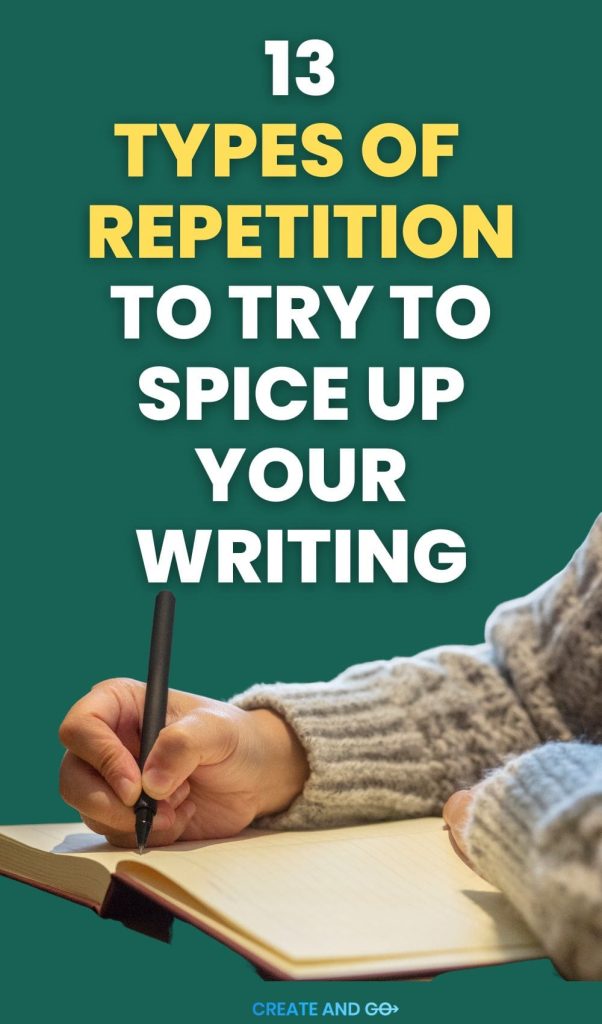
Repetition is a powerful literary tool and a fundamental element of good writing in a multitude of contexts.
It can be harnessed to emphasize a point, evoke an emotion, create rhythm, and even to underline themes in a piece of work.
This article will delve into the repetition definition, various types of repetition, and some common examples to provide you with a comprehensive understanding of what it is and how it can be effectively employed in your writing.
Whether you’re a seasoned writer or a novice looking to finesse your technique, this guide is designed to equip you with valuable insights to elevate your written work!

What is Repetition in Writing?
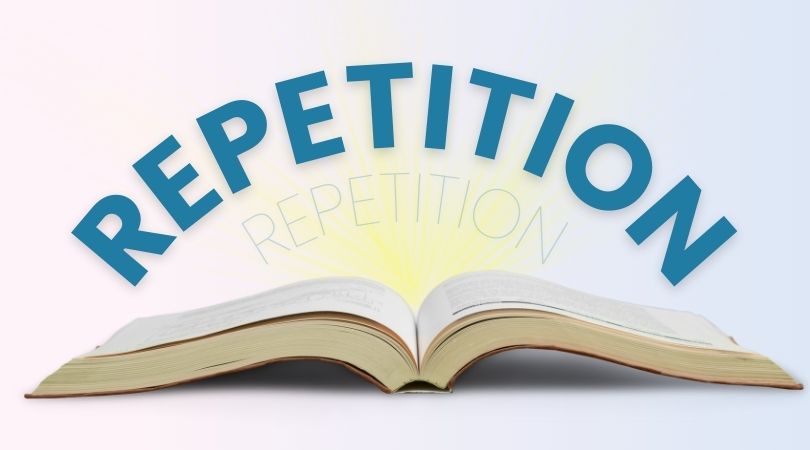
Repetition is the repeating of words, phrases, or ideas within a piece of writing.
It can be used in various forms such as repetition of single words, phrases, entire sentences, or even structures.
It is a literary technique that has been utilized by writers for centuries to emphasize and reinforce key points, evoke emotions, and create a memorable impact on readers.
Moreover, repetition is not limited to literature or creative writing, it is also frequently employed in advertising and public speaking to make a message stick with the audience.
Now that we have an understanding of what repetition is, let’s dive into some examples of how it can be effectively used in writing.
13 Types of Repetition With Examples
Repetition is a very versatile literary device and can be used in many different ways.
Here are 10 types of repetition, accompanied by examples of each:
1. Anaphora
Anaphora is the repetition of the same word or phrase at the beginning of successive phrases.
One of the most famous anaphora examples comes from Martin Luther King Jr.’s famous “I have a dream” speech:
“I have a dream that one day this nation will rise up and live out the true meaning of its creed: ‘We hold these truths to be self-evident, that all men are created equal.’ I have a dream that one day on the red hills of Georgia, the sons of former slaves and the sons of former slave owners will be able to sit down together at the table of brotherhood.” – Martin Luther King
Another example:
“ It was the best of times, it was the worst of times, it was the age of wisdom, it was the age of foolishness, it was the epoch of belief, it was the epoch of incredulity…” – Charles Dickets, A Tale of Two Cities
2. Epistrophe
Epistrophe is similar to anaphora, but instead of repeating words or phrases at the beginning of clauses or sentences, it is repeated at the end.
An example can be found in this 2008 presidential victory speech:
“Because if we are willing to work for it and fight for it and believe in it, then I am absolutely certain that generations from now, we will be able to look back and tell our children…” – Barack Obama
3. Symploce
Symploce is the combination of anaphora and epistrophe, where a word or phrase is repeated at both the beginning and end of successive clauses or sentences.
A great example of repetition with symploce can be seen in ‘I Sing the Body Electric:’
“And if the body does not do fully as much as the soul ? And if the body were not the soul, what is the soul ?” – Walt Whitman
4. Alliteration
Alliteration is the repetition of initial consonant sounds in a series of words. It is commonly used in poetry and creates a musical effect.
Some common alliteration examples include:
- From The Great Gatsby by F. Scott Fitzgerald: “So we b eat on, b oats against the current, b orne b ack ceaselessly into the past.”
- From Shakespeare’s Beowulf: “To f east his f ill of the f lesh of men.”
5. Assonance
Similar to alliteration, assonance is the repetition of vowel sounds in a series of words.
It creates a musical quality to your tone of writing and can evoke certain emotions in readers.
A simple repetition example of assonance can be heard in the words “cr y ing t i me” , where there is a repetition of the long “i” sound between each of the words.
6. Consonance
Consonance is the repetition of consonant sounds within words, rather than just at the beginning.
It adds a sense of rhythm and musicality to writing.
For example, “ L aura ca ll ed to te ll me that L i l a had fa ll en i ll .”
The consonant sound “L” is repeated throughout this phrase.
6. Anadiplosis
Anadiplosis is the repetition of a word or phrase at the end of one clause or sentence and then at the beginning of the next.
It creates a strong connection between ideas. For example:
“Fear leads to anger , anger leads to hate , hate leads to suffering.” – Yoda in Star Wars
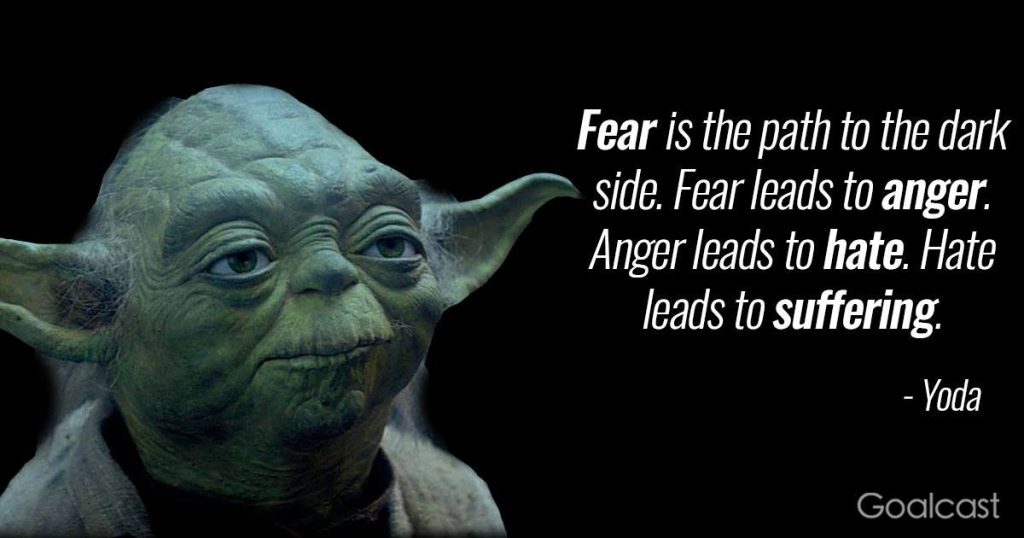
7. Epanalepsis
Epanalepsis is the repetition of the same word or phrase at both the beginning and end of a clause or sentence.
It is used to create emphasis and make a point clear.
A famous example of repetition in literature in the form of epanalepsis is:
“ Blood hath brought blood , and blows answer to blows .” – William Shakespeare, Macbeth
Diacope is a type of repetition that occurs when the same word or phrase is repeated with other words in between.
It comes from the Greek word “diakopon” which means to cut through.
Some examples include:
- “To be , or not to be ” – William Shakespeare in Hamlet
- “ Bond . James Bond .” – James Bond movies
- “He’s so good at playing the guitar. It’s like he was born with a guitar in his hands.”
8. Polyptoton
Polyptoton is the repetition of words with different forms or tenses within a sentence.
It can add complexity and depth to writing. For example:
“I dreamed a dream.” – Les Misérables by Victor Hugo
9. Antistasis
Antistasis is the repetition of a word in a different sense or meaning within the same sentence.
It can create interesting wordplay and add depth to writing.
“ Nothing will come of nothing .” – Shakespeare, Hamlet
10. Antanaclasis
Antanaclasis is the repetition of a word or phrase in two different meanings. It can create clever wordplay and add depth to writing.
“Time flies like an arrow, but fruit flies like a banana.” Groucho Marx
In this example, the word flies has a different meaning in the context of time and the type of insects that love bananas.
“If you aren’t fired with enthusiasm, you will be fired with enthusiasm.” -Vince Lombardi
11. Epimone
Epimone is a repeated phrase or question to emphasize an important point.
It can also be used as a rhetorical device to engage and persuade readers.
One example of repetition in the form of epimone can be seen below:
“All his brains are in the nape of his neck , Simon Dedalus says. Welts of flesh behind on him. Fat folds of neck , fat , neck , fat , neck .” – James Joyce, Ulysses
12. Epizeuxis
Epizeuxis is the repetition of the same words or phrases for emphasis and intensity.
It adds emotional weight to writing and can create a sense of urgency.
- “ Never , never , never give up.” – Winston Churchill
- “Oh Romeo , Romeo , wherefore art thou Romeo ?” – William Shakespeare in Romeo and Juliet.
13. Negative-Positive Restatement
Negative-positive restatement is the repetition of an idea in both a negative and positive form or with opposite meanings.
It can highlight contrasts and add depth to writing.
An example can be found in this famous speech:
“We must learn to live together as brothers or perish together as fools .” – Martin Luther King
The concept is not repeated, but rather the idea is restated in a negative and positive form.
30 Repetition Examples
Now that you have an idea of different types of repetition, here are some other common examples in various contexts.
Repetition Examples in Literature
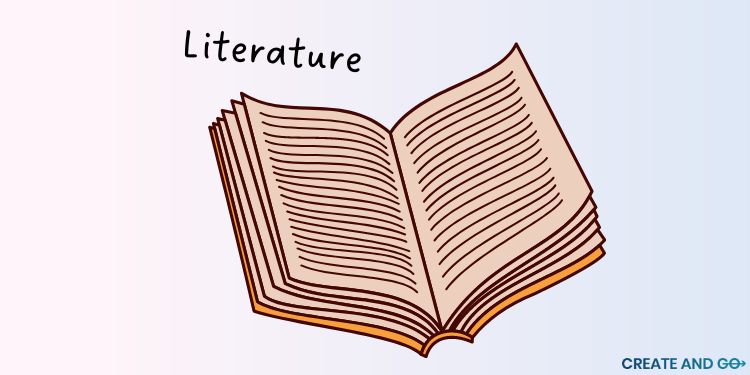
- “Because I do not hope to turn again. Because I do not hope . Because I do not hope to turn…” – T.S. Eliot in Ash Wednesday
- “I felt happy because I saw the others were happy and because I knew I should feel happy .” – David Foster Wallace in Infinite Jest
- “I am Sam. Sam I am.” – Dr. Seuss in Green Eggs and Ham
- “And miles to go before I sleep, And miles to go before I sleep.” – Robert Frost in Stopping by Woods on a Snowy Evening
- “In a hole in the ground there lived a hobbit. Not a nasty, dirty, wet hole , filled with the ends of worms and an oozy smell, nor yet a dry, bare, sandy hole with nothing in it to sit down on or to eat: it was a hobbit- hole , and that means comfort.” – The Hobbit by J.R.R. Tolkien
Repetition Examples in Speeches and Politics
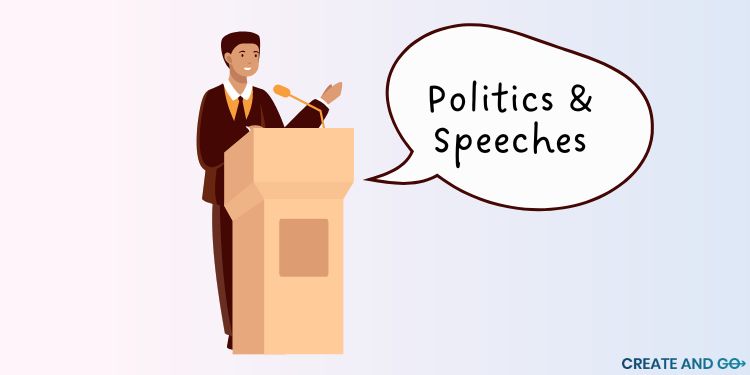
- “I have a dream.” – Martin Luther King Jr.’s famous speech
- “ Ask not what your country can do for you, ask what you can do for your country.” – John F. Kennedy’s inauguration speech
- “We will fight on the beaches, we will fight on the landing grounds, we will fight in the fields and in the streets…” – Winston Churchill’s speech
- “The only thing we have to fear is fear itself.” – Franklin D. Roosevelt’s inaugural address
- “There is nothing wrong with America that cannot be cured by what is right with America .” – Bill Clinton’s inaugural address
Repetition Examples in TV and Film
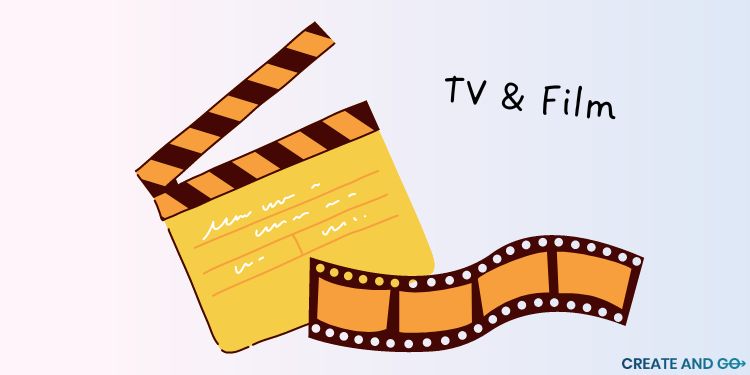
- “ Keep your friends close, but your enemies closer. ” – The Godfather Part II
- “ With great power, comes great responsibility. ” – Spider-Man
- “I want the truth ! You can’t handle the truth !” – A Few Good Men (1992)
- “Are you talkin’ to me? Are you talkin’ to me?” – Taxi Driver
- “ Wax on. Wax off.” – The Karate Kid
Repetition Examples in Music
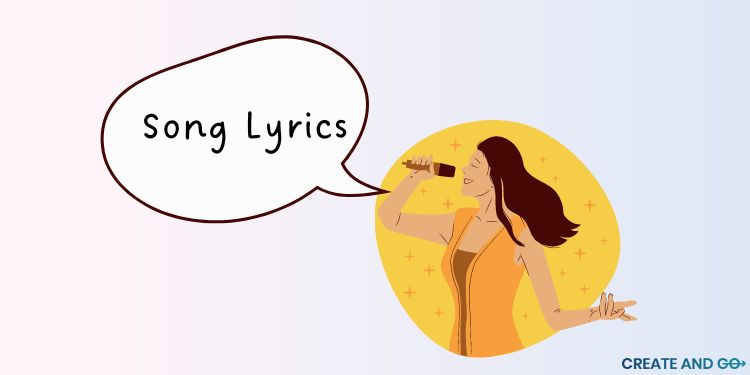
- “I want to break free. I want to break free.” – I Want to Break Free by Queen
- “I will follow you, Follow you wherever you may go” – I Will Follow You by Elvis Presley
- “Let it be, let it be, let it be, let it be . Whisper words of wisdom, let it be.” – Let It Be by The Beatles
- “ I will always love you . I will always love you.” – I Will Always Love You by Whitney Houston
- “The love you get is equal to the love you make.” – The End by The Beatles
How to Use Repetition Effectively in Writing
Here are some tips to use repetition effectively in your writing:
- Choose the right type of repetition: Consider the purpose and tone of your writing to decide which form of repetition will be most effective. For example, if you want to add emphasis or intensity, epizeuxis might be a good choice. If you want to create an emotional connection, using positive-negative restatement can be effective.
- Use repetition for emphasis: Repetition is a powerful tool to emphasize important ideas or create a sense of urgency in your writing. Use it sparingly and strategically for best effect.
- Create rhythm: Repetition can also add rhythm and flow to your writing, making it more engaging and memorable for readers.
- Avoid overusing repetition: Too much repetition can be monotonous and boring for readers. Make sure to use it sparingly and vary your language to keep readers engaged.
- Consider the context: Repetition may not always be appropriate in certain contexts, such as academic or formal writing. Consider the purpose of your writing and audience before using repetition.
- Edit with intention: After writing, review your work and check if the repetition adds value or if it can be replaced with other techniques to improve the overall impact of your writing.
So next time you’re writing something, remember the power of repetition and use it effectively to engage and persuade your readers.
FAQs About Repetition
Repetition in literature refers to the recurrent use of words, phrases, or structures for emphasis or to make a point. One classic example is Edgar Allan Poe’s “The Raven,” where the word “nevermore” is repeated at the end of several stanzas, creating a haunting effect and emphasizing the speaker’s despair.
A good sentence showcasing repetition could be, “She runs fast, she runs efficiently, she runs like the wind.” In this sentence, the repetition of the phrase “she runs” creates emphasis on the speed and skill with which she runs. This repetition not only stresses the point but also adds rhythm to the sentence.
One famous example of repetition is Martin Luther King Jr.’s iconic speech, “I Have a Dream,” which repeats the phrase “I have a dream” multiple times for emphasis and to inspire hope in his audience. This repetition also adds rhythm and power to the speech, making it memorable and impactful.
Repetition is a common technique used in music to create rhythm, emphasize lyrics, or enhance the overall effect of a song. One popular example is the chorus of Beyonce’s hit song “Single Ladies,” where the phrase “if you like it then you should’ve put a ring on it” is repeated multiple times throughout the song. This repetition not only makes the chorus catchy and easy to remember, but it also reinforces the message of the song.
Key Takeaways for Writing Repetition
In conclusion, the use of repetition can greatly amplify the impact of your writing, whether it’s for a poem, a speech, or a song lyric.
When used judiciously, repetition can emphasize key points, evoke emotional responses, and create rhythm.
Famous writers, politicians, and musicians have employed this technique to bring their words to life and leave a lasting impression on their audience.
However, to avoid monotony, it is critical to use this tool sparingly and strategically.
Consider your purpose, audience, and overall context while applying repetition in your writing.
With the right balance, this literary device can turn your piece from ordinary to memorable!
Enter a search request and press enter. Press Esc or the X to close.
- Bookfox Academy (All Courses)
- Write Your Best Novel
- How to Write a Splendid Sentence
- Two Weeks to Your Best Children’s Book
- Revision Genius
- The Ultimate Guide to Writing Dialogue
- Your First Bestseller
- Master Your Writing Habits
- Writing Techniques to Transform Your Fiction
- Triangle Method of Character Development
- Children’s Book Editing
- Copy Editing
- Novel Editing
- Short Story Editing
- General Books
- Children’s Books
17 Fantastic Repetition Examples in Literature
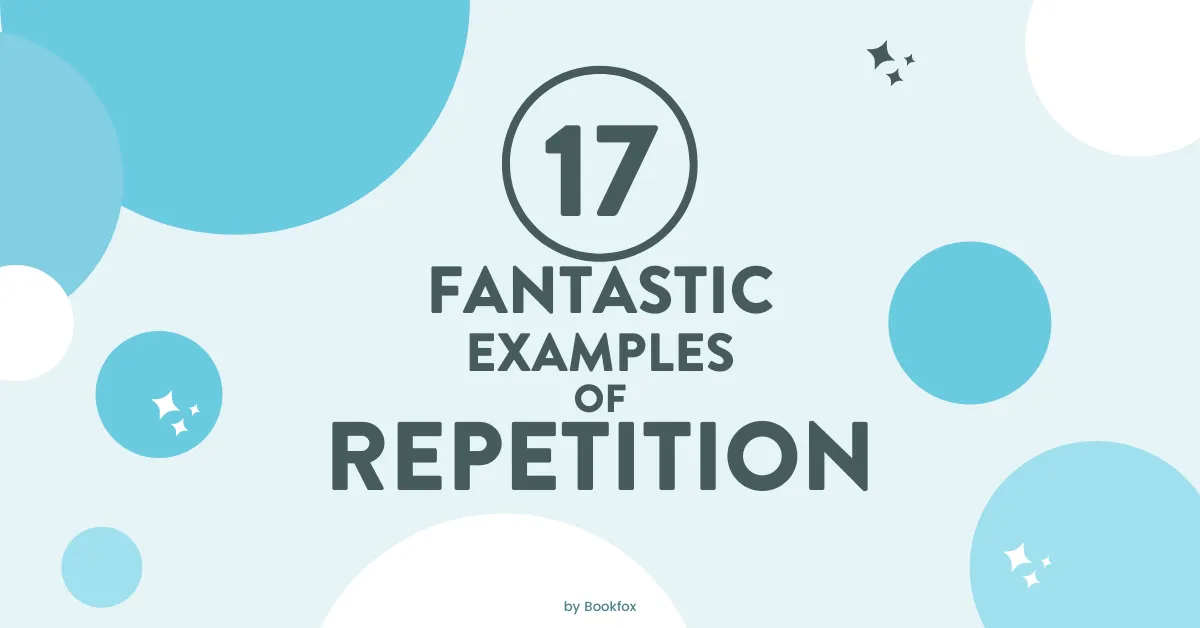
The governing wisdom about writing sentences says not to repeat. Repetition is bad. Repetition is sloppy. Writers are encouraged to consult a thesaurus and change up that pesky offending word.
But is this really true?
Literature is full of repetition. Literary writers constantly use the literary device of repeated words. I think the only type of repetition which is bad is sloppy repetition. Repetition which is unintentional, which sounds awkward.
If you repeat on purpose, repetition is gorgeous.
I mean, think about music. Music is all about repetition and patterns. If you didn’t have repetition in music, it would all just be noise.
Please study the repetition examples below, which are mostly figures of speech, to learn how to repeat well. Here are a few more tips:
- The repeated word has to evolve in some way. Every time it’s repeated, it’s the same word but in a different context, and by the end of the sentence we should be seeing that word in an entirely different light.
- Or: it has to be funny. Sometimes repeated words can just be funny, simply because you keep repeating them. Think about how many jokes rely on repetition.
And once you learn the skill of repetition, you’ll be ready for my advice on how to write a novel .
Even if you’re a beginner, this post “12 Steps to Writing a Bestseller” will guide you through the process of novel writing.
Repetition Examples:
1. “Nory was a Catholic because her mother was a Catholic, and Nory’s mother was a Catholic because her father was a Catholic, and her father was a Catholic because his mother was a Catholic, or had been.”
– Nicholson Baker, The Everlasting Story of Nory
Six repetitions in this sentence! Catholic is repeated six times, and by the end, it’s actually funny. That’s really important about repetition — it’s essential for humor.
So many jokes rely upon repeating the same word in different ways. In fact, in the stand-up comedy world, there’s a term for it: A Callback . It’s when you reference a joke that you made earlier in a new context, and through that repetition it’s funny in a whole new way.
But what makes this sentence great is the ending. Those last three words, which break the tense of the previous 6 verbs (was, was, was, was …) and then “had been.” Ha! The father was a Catholic simply because his mother was formerly a Catholic.
2. “I felt happy because I saw the others were happy and because I knew I should feel happy, but I wasn’t really happy.”
– Roberto Bolano, 2666
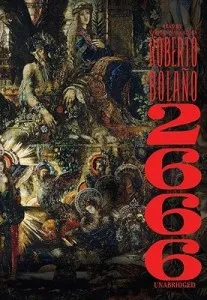
Four repetitions of the word “happy.” But every time the word is functioning in different ways.
- He feels happy.
- Others feel happy
- He is being forced into happiness (is he actually happy?)
- The truth: He is actually not happy at all
This sentence is also a great example of a sentence that starts in one place and ends in another. We start with the belief in the narrator’s happiness, but by the end, we are surprised to find that he only feels like he should be happy rather than actually feeling true happiness. The sentence has been a journey that has taken us somewhere, from a stated truth to reversing that truth.
3. “But good morning! Good morning to ye and thou! I’d say to all my patients, because I was the worse of the hypocrites, of all the hypocrites, the cruel and phony hypocrites, I was the very worst.”
– Joshua Ferris, To Rise Again at a Decent Hour
What’s great about this repetition example is that it’s a loose palindrome .
There is a “worse” followed by 3 examples of “hypocrites” followed by another “worst.”
If you just took those five words, they would read the same forwards as backwards. You might say that “worse” is not the same as “worst,” and yes, that’s a small difference, but repetition doesn’t have to be exact for it to work on the reader.
4. “So I said yes to Thomas Clinton and later thought that I had said yes to God and later still realized I had said yes only to Thomas Clinton.”
– Ann Patchett, The Patron Saint of Liars

Is this about sex? About marriage? In any case, this is a perfect hourglass shape: an identical beginning and end with an interlude in the middle.
Once again, this sentence shows us the journey of a narrator that starts thinking one thing, changes her mind, only to change back to what she originally thought.
By repeating “yes” again and again, Patchett references the most famous case of repetition in literature: the end of Ulysses by James Joyce, which is definitely about sex:
“… then I asked him with my eyes to ask again yes and then he asked me would I yes to say yes my mountain flower and first I put my arms around him yes and drew him down to me so he could feel my breasts all perfume yes and his heart was going like mad and yes I said yes I will Yes.”
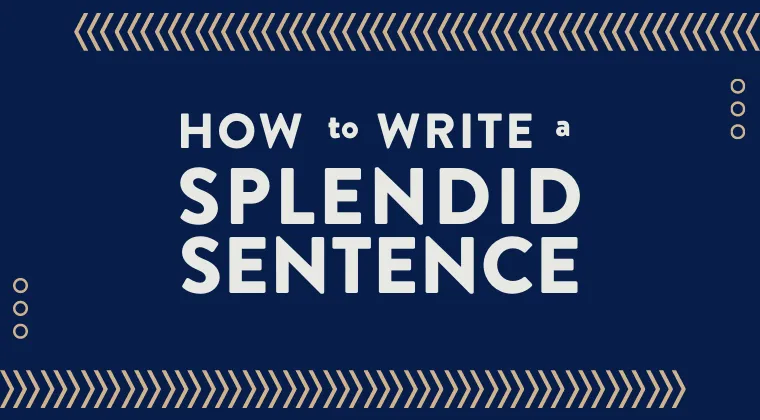
5. “Even if they are djinns, I will get djinns that can outdjinn them.”
– Ngugi wa Thiong’o, Wizard of the Crow
What an awesome sentence. Isn’t djinn an awesome word? Especially with the made-up word of “outdjinn”? And that’s how the repetitions evolve in this sentence: through a coinage of a new word that plays upon the repeated word.
6. “Hatred was spreading everywhere, blood was being spilled everywhere, wars were breaking out everywhere.”
– Shusaku Endo, Deep River
This is an example of epistrophe , which is literary trope where the same word is repeated at the end of every phrase (the opposite of this is anaphora, where the same word is repeated at the beginning of every phrase).
By repeating everywhere three times, Endo holds the whole of the sentence together and gives it shape and rhythm.
7. “Almost nothing was more annoying than having our wasted time wasted on something not worth wasting it on.”

– Joshua Ferris, Then We Came to the End
Ferris is writing about the drudgery of working in a corporate office, and wasted time had to be at the front of his concerns. I love that repeated phrase “wasted time wasted.” As if the time was already wasted, but it was going to be wasted again by spending it on non-worthwhile projects.
This basically sounds like every corporate meeting that has ever occurred.
8. “The depressed person was in terrible and unceasing emotional pain, and the impossibility of sharing or articulating this pain was itself a component of the pain and a contributing factor in its essential horror.”
– David Foster Wallace, Brief Interviews with Hideous Men
How perfect in a sentence about depression that Wallace would repeat “pain” three times. It’s almost as if he’s trying to drill pain into the reader’s brain by repetition, as if he wants you to truly feel the pain of depression that he’s trying to communicate.
Which is exactly what he’s accomplishing, because the thrust of this sentence is that non-depressed people can’t understand the pain of depressed people. Unless … this sentence can somehow pound it into them: pain, pain, pain.
9. “Paranoids are not paranoid because they’re paranoid, but because they keep putting themselves, fucking idiots, deliberately into paranoid situations.”
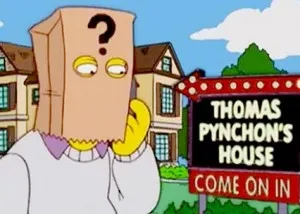
– Thomas Pynchon, Gravity’s Rainbow
You should have laughed at this sentence. Because Pynchon is normally funny, and here he’s being hilarious.
As if the problem with paranoids was not in their brains, but with the external world.
The bonus is that one of Pynchon’s main themes is paranoia — it’s what most of his books focus on — and so he sure knows about the logic of paranoia.
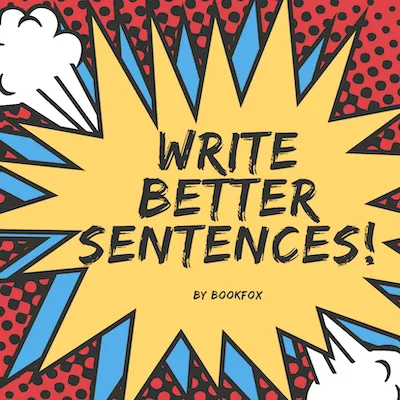
10. “Because the world is a place of silence, the sky at night when the birds have gone is a vast silent place.”
– Colm Toibin, The Testament of Mary
Just two repetitions here, and not exact ones: silence and silent. This sentence works like an echo : the first part is a grand description of the silence of the world, while the second part is a specific description of the silence of birds.
11. “There are some things that are so unforgivable that they make other things easily forgivable.”
– Chimamanda Ngozi Adichie, Half of a Yellow Sun
Here is repetition built upon opposites: unforgivable and forgivable.
Here’s a sentence challenge: try to write a sentence that flip-flops between opposite words multiple times. For instance, use unforgivable twice and forgivable twice, showing the back and forth of the narrator.
12. “I had known loneliness before, and emptiness upon the moor, but I had never been a NOTHING, a nothing floating on a nothing, known by nothing, lonelier and colder than the space between the stars.”

– Peter Carey, Parrot and Olivier in America
This is the loneliest sentence of all time. Like David Foster Wallace, he chooses a word that accents his thematic word of loneliness, rather than loneliness itself.
Because if he repeated loneliness, it wouldn’t be as powerful as actually making you feel lonely, which is what he does by repeating the word “NOTHING.”
“Nothing” is a word that actually makes you feel lonely. Four punches of this word and you as a reader feel like you’ve been knocked out. It’s one of the most powerful repetition examples on this page.
13. “You’re an insomniac, you tell yourself: there are profound truths revealed only to the insomniac by night like those phosphorescent minerals veined and glimmering in the dark but coarse and ordinary otherwise; you have to examine such minerals in the absence of light to discover their beauty, you tell yourself.”
– Joyce Carol Oates, Small Avalanches and Other Stories

Most of the repetition we’ve looked at so far has been word repetition, and so here’s a phrase repetition.
“You tell yourself.” These three words, when they appear first, are rather innocuous. It’s something this person says to herself. But when it’s repeated a second time, as a coda to the sentence, it takes on an entirely new meaning: this is an example of self-deception.
The narrator is telling herself something that isn’t true. The insomnia is likely hurting her, and she only believes it is helping her to avoid further pain.
For someone of Oates prodigious output, it’s surprising she doesn’t repeat more (that’s a bad attempt at a literary repetition joke. I apologize).
14. “Every person had a star, every star had a friend, and for every person carrying a star there was someone else who reflected it, and everyone carried this reflection like a secret confidante in the heart.”
– Orhan Pamuk, Snow
A couple different repetitions here. Star is repeated three times. Person is repeated twice and reflected/reflection is repeated twice.
But when you read it, it doesn’t seem redundant in any way. That’s because redundancy is unnecessary repetition, while beautiful repetition is exactly what the sentence needs.
15. “As my grandfather went, arm over arm, his heart making sour little shudders against his ribs, he kept listening for a sound, the sound of the tiger, the sound of anything but his own feet and lungs.”
– Tea Obreht, The Tiger’s Wife
We have an early repetition example with “arm over arm,” but the true repetition comes in the triple phrase at the end. It’s an example of anaphora , with a word being repeated at the beginning of phrases.
But my favorite part of the sentence is the “sour little shudders” of the heart.
16. “She was young the way an actual young person is young.”
– Nell Zink, The Wallcreeper

You’re looking for a metaphor here. She was young in the way … of something. And Zink resists that. She pushes pie in the face of a metaphor.
She’s going to deflate all your expectations and say that there’s only one way to be young: to be an actual young person.
This is why Zink is one of the funniest, zaniest writers out there.
17. “No heart is so hard as the timid heart.”
– Norman Mailer, The Gospel According to the Son
Here we have a bit of a paradox. You wouldn’t think a timid heart would be a hard heart. By the second repetition of “heart,” Mailer has reversed your expectations of the sentence.
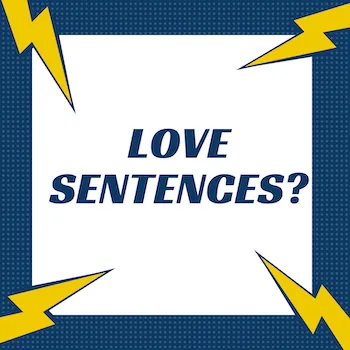
Do you have examples of repetition in literature? I’d love to read them in the comments below!
If you want more repetition examples or just plain amazing sentences, check out my post on 100 Beautiful Sentences or my course on how to write a splendid sentence .
Related posts:
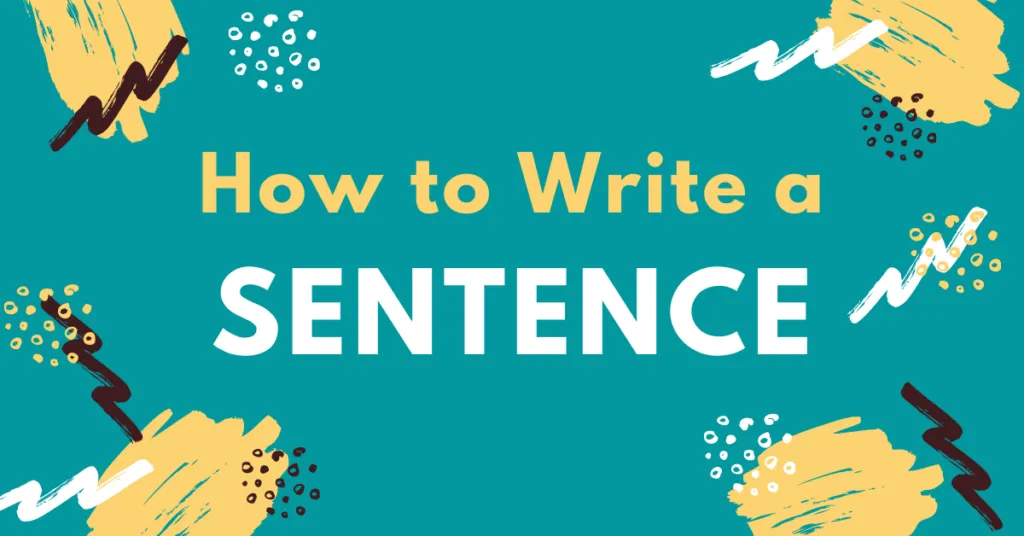
Leave a Reply Cancel reply
Your email address will not be published. Required fields are marked *
Thank you so much! 🥰
This is great advice. I have been thinking of writing a children’s book for decades now and this has really given me something to think about and apply. It all felt so overwhelming but now it seems a bit more manageable. Thank you!
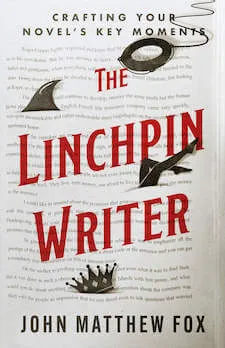
Every writer NEEDS this book.
It’s a guide to writing the pivotal moments of your novel.
Whether writing your book or revising it, this will be the most helpful book you’ll ever buy.
Learn how to:
- Nail chapter endings
- Surprise your reader with plot twists
- Describe a character for the first time
- Write a killer ending
- Skip to primary navigation
- Skip to main content
- Skip to footer
Enchanting Marketing
Writing advice for small business
Word Repetition: How to Make Your Writing Resonate Like Good Music
by Henneke | 64 enchanting opinions, add yours? :)
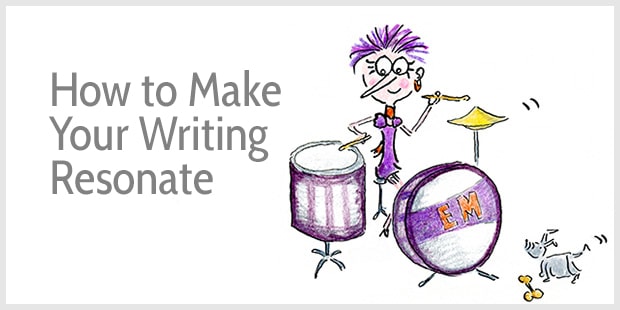
Whenever you repeated a word in a sentence, there it was: the angry red mark. Ouch.
Over time, like most writers, you probably learned to avoid word repetition, and you diligently replaced duplicated words with synonyms or pronouns.
But did you know word repetition can add rhythm to your writing?
That it can strengthen your message, and make it more memorable?
And that repetition can shape your voice ?
No matter what you write, whether it’s a blog post, sales copy, or poetry, purposeful repetition can add power and pizzazz to your writing .
Shall we start with an example from poetry?
Repetition examples in poetry
I’ve not read poetry for years, but recently I’ve fallen in love with Mary Oliver’s evocative poems.
Below follows a fragment from her poem Mushrooms . Read it aloud, and notice how repetition of the words through and their adds rhythm:
red and yellow skulls pummeling upward through leaves, through grasses, through sand; astonishing in their suddenness, their quietude, their wetness, they appear on fall morning, some balancing in the earth on one hoof packed with poison, others billowing chunkily, and delicious
And in the poem The Moths , she repeats a longer phrase:
I was so full of energy. I was always running around, looking at this and that. If I stopped the pain was unbearable. If I stopped and thought, maybe the world can’t be saved, the pain was unbearable. Finally, I had noticed enough. All around me in the forest the white moths floated. How long do they live, fluttering in and out of the shadows?
But this is not an article about poetry. Repetition works in any type of writing, even in sales copy.
Repetition examples in sales copy
Perhaps Apple’s copywriters are the poets in the world of marketing. Here are some examples of repetition in Apple’s sales copy :
Your all purpose, all day notebook.
iOS 13 A whole new look. On a whole new level.
Every decision that goes into iPhone makes it stand apart. From the way it’s made, to the way we build in privacy and security from the start, to the innovative ways we recycle its components.
Repetition not only provides a beat to your writing, it can also reinforce a key point. In the examples above, repetition strengthens the message that iOS 13 is wholly new and that the iPhone stands out in many different ways.
Repetition also shapes your voice
I first learned about repetition as a technique for forming your voice from author Andy Martin.
In his book Reacher Said Nothing: Lee Child and the Making of Make Me, he tells the story of Child writing his 20th Jack Reacher book, and he explains his discovery of the double tap in Child’s writing.
The double tap is a repetition of the word no . This is an example from Make Me :
The street was quiet. Just seven similar houses, three on a side, plus one at the dead end. No moving vehicles, no pedestrians. No eyes, no interest. Not really a Neighborhood Watch kind of place.
And from Persuader :
I saw nobody. No cops, no ambulances, no police tapes, no medical examiners. No unexplained men in Lincoln Town Cars.
Perhaps no one seems to use repetition as much as Nora Ephron. This is from Heartburn :
Heartburn. That, it seemed to me as I lay in bed, was what I was suffering from. That summed up the whole mess: heartburn. Compound heartburn. Double-digit heartburn. Terminal heartburn.
I loved to cook, so I cooked. And then the cooking became a way of saying I love you. And then the cooking became the easy way of saying I love you. And then the cooking became the only way of saying I love you.
Vera said: ‘Why do you feel you have to turn everything into a story?’ So I told her why: Because if I tell the story, I control the version. Because if I tell the story, I can make you laugh, and I would rather have you laugh at me than feel sorry for me. Because if I tell the story, it doesn’t hurt as much. Because if I tell the story, I can get on with it.
At school you may have been told that repetitiveness is bad. But if an award-winning screenwriter and author can repeat words and sentence fragments, who are we to say that repetition is bad?
The above are just three examples of repetition in Ephron’s writing. There are many, many, many more.
Repetition keeps readers on track
Word repetition can provide a cadence to your writing and guide readers so they don’t get lost. This is especially important in long sentences .
In the example below, Tommy Orange repeats the phrase where to help readers understand the sentence structure:
The grass is chalked with straight lines that separate foul and fair, that reach out to the stands and back toward the infield, where the players play the game, where they pitch and swing and steal and tag, where they signal and hit and strike and ball, score runs, where they sweat and wait in the shade of the dugout, just chewing and spitting until all the innings run out.
And, in the same way, he repeats the word whose here:
That guy in the black windbreaker, whose hair is fully grayed and receding, and whose stomach comes out a little more each year, whose feet and knees hurt when he stands or walks too long, he’s okay, he’s making it.
Word repetition is only bad when it happens by accident. Most of the time, it’s like the drum beat accompanying your writing.
And sometimes, the drum has a solo—when word repetition becomes the essence of a sentence. Here’s Tommy Orange again:
She told me the world was made of stories, nothing else, just stories, and stories about stories.
The trouble with believing is you have to believe that believing will work, you have to believe in belief.
A drum solo is rare. Mostly repetition is an underlying beat, providing a cadence to your writing.
How to use repetition correctly
As Joe Moran writes in his book First You Write a Sentence :
Repetition is fine if you and the reader know you are doing it.
But how does your reader know you’re doing repeating a word on purpose?
Below follows an example of repetition that’s so obvious, that it has to be on purpose. Here’s Tommy Orange again:
She put a cough drop into her mouth so casually that you could tell she probably ate a lot of cough drops and smoked a lot of cigarettes, and never quite beat the cough, but beat it enough while she was sucking on a cough drop, and so ate them constantly.
Moran suggests that inexperienced writers use repetition too randomly, making it jarring. And more experienced writers are afraid of repetition, so they vary their words too much, making the writing feel unnatural.
Let’s have another look at the sentence with cough drops. Imagine Tommy Orange had been afraid of repetition. He would have written:
She put a cough drop into her mouth so casually that you could tell she probably ate a lot of them and smoked a lot of cigarettes, and never quite beat the tickle in her throat, but she could cope while she was sucking on throat lozenges, and so ate them constantly.
Note how the music has gone out of that sentence? Without the music, the sentence drags on a little, making it feel too long and cumbersome.
One more fabulous example of word repetition
In The Writing Life , Annie Dillard writes about not saving ideas for writing for later:
One of the few things I know about writing is this: spend it all, shoot it, play it, lose it, all, right away, every time. Do not hoard what seems good for a later place in the book, or for another book; give it, give it all, give it now. The impulse to save something good for a better place later is the signal to spend it now.
Why do I like these so much?
The first sentence has a great selection of strong verbs : shoot, play, lose . Read this sentence aloud and you’ll notice a great rhythm, too.
The second sentence ends with a triple tap for stress: give it, give it all, give it now . Again, read aloud to appreciate the rhythm .
The third sentence is the clincher summarizing the key advice, so readers remember: Grab any good ideas right now and spend them.
How to put music into your writing
Using repetition correctly is not as difficult as your high school teacher would have told you.
The easiest trick is Child’s double tap of repeated no’s. No repetition. No music. And no fun in your writing.
The second easiest trick is a variation of the double tap: to repeat the first word of a sentence at the start of the next sentence (this is called anaphora).
Stop being afraid of repetition. Stop paying attention to readability scores telling you to mix it up. Stop worrying about your high school teacher crossing out your words, with her ghastly red pencil. Instead, have fun with word repetition and listen to the rhythm of your writing.
Next, pay attention to word repetition in good writing . Apple’s website is a good starting point—you’ll find repetition is never overbearing there, and mostly used to reinforce key points, making them more memorable.
In Ephron’s Heartburn and Orange’s There There , repetition is a more dominant style figure. Read their work aloud and note how it pulsates, echoes, and sometimes booms. Reading aloud can help you develop an ear for when repetition works.
Writing without word repetition is like music without a beat.
Like a rock band without a drummer.
Happy writing!
Books mentioned in this post:
- The Writing Life by Annie Dillard
Recommended reading on rhythm and writing:
Enjoyed this get my fortnightly newsletter in your inbox > > >, get my best writing tips in your inbox ....
Success! Now check your email to confirm your subscription.
There was an error submitting your subscription. Please try again.
Reader Interactions
Leave a comment and join the conversation cancel reply.
December 10, 2022 at 12:11 pm
I really enjoyed your commentary! The only thing I’m good at is playing piano. Throughout my life, music has played a significant role in my life.
It is now clear to me why repetition is an invaluable part of my writing process. The analogy of music is so appropriate here! The Apple and Nora Ephron examples you provided are fantastic (seriously, what is she incapable of writing?) Thanks for pointing that out!
December 11, 2022 at 8:04 am
As a pianist you’ll be good at putting music into your words, too!
April 5, 2022 at 8:40 pm
Greetings Henneke Your composing is what I truly wanted to hear Henneke. I’m continuously attempting to supplant rehashing words with their equivalents. In any event, when I would rather not eliminate them, I’m continually informed that ‘something other than what’s expected could work here’. It’s difficult to clarify ‘significant composition’ for people that just value Jargon.
April 5, 2022 at 8:57 pm
A lot of people say that repetition is always wrong but that’s true. It can be used for rhythm and style, as long as we do it on purpose. Using synonyms instead can sometimes feel unnatural.
Thank you for stopping by, Jackolier.
September 17, 2019 at 2:35 pm
Henneke, This is a wonderful topic. I just wish you would provide more business examples here (and elsewhere) so emerging copywriters could more easily see how to apply this kind of principle to marketing writing without making it too literary. Thank you.
September 17, 2019 at 5:19 pm
I don’t think I can meet your expectations, Marcia. Gathering examples is hugely time consuming, and sometimes I find examples from fiction writing are simply better. Even so, in this post you have three examples of word repetition in sales copy from Apple, and three examples from blog writing if you check out my own writing in the last paragraphs.
If you’re looking for more examples of word repetition, I recommend you read Apple’s website or continue reading my blog. I use repetition often.
Also, creating your own swipe file of examples is one of the best ways to learn copywriting.
September 17, 2019 at 5:40 pm
Thanks for your reply, Henneke. Of course fiction will provide better examples of good writing techniques. However, that doesn’t mean you can write a sales page as if it’s A Farewell to Arms!
If your audience is mainly business owners and copywriters (maybe I’m wrong about that), I believe they would appreciate more business-related examples, even if you need to make them up. This would enable them to see more clearly how fiction-writing or memoir-writing techniques do and do not transfer to business writing.
Your blog is immensely informative, entertaining and useful, and it would be even more helpful if your tips were clearly applicable to the writing tasks readers are engaged in.
September 17, 2019 at 6:00 pm
I’m not suggesting that people write sales pages as if it’s A Farewell to Arms but I do believe that business writers can learn a lot from good fiction. This is one of the things I like to show people—how you can learn to write better by reading widely and understanding why you like certain writing and don’t like other writing.
I hear regularly that readers feel inspired by the mix of examples on my blog—even so that several have told me they’ve started reading fiction again. I don’t know whether people who don’t like the examples stay quiet or unsubscribe.
You’ll find many blog posts that exclusively feature business examples—either real or made up; others have a mix, and some have only fiction (or memoir) examples.
August 27, 2019 at 12:24 pm
Hi Henneke Your writing is music to my ears Henneke. I’m always trying to replace repeating words with their synonyms. Even when I don’t want to remove them, I’m constantly told that ‘something different could work here’. It’s hard to explain ‘valuable writing’ to folks that only appreciate Jargon.
Your words are an inspiration 🙂
August 27, 2019 at 2:48 pm
Yes, so often people have heard of the rule about avoiding repetition, and they don’t understand repetition can be a writing technique to create a rhythm. When people complain, you can always send them a link to this blog post 😉
Happy writing, Rameeza, and thank you for stopping by. 🙂
August 22, 2019 at 1:10 am
Wonderful commentary! I’m an amateur musician. Music has always been a big part of my life. Now I understand why I enjoy using repetition in my writing. Music is such a great analogy here! I especially love your examples from Apple and Nora Ephron (seriously, is there anything she can’t write?) Thankyou!
August 22, 2019 at 12:59 pm
I’m not surprised that with a keen sense of rhythm, you enjoy using repetition in your writing. Even when you don’t read aloud, you still hear the rhythm of your writing.
Nora Ephron uses repetition a lot. Some people say she uses repetition too often, but it’s an essential part of her voice.
Happy writing, Kate. And thank you for stopping by.
July 12, 2019 at 5:46 am
Great and very useful for literature lovers.
July 12, 2019 at 10:08 am
And hopefully useful for anyone who loves writing 🙂
June 17, 2019 at 6:54 am
Hi Henneke, I am a reader of your blog and wanted to reach you to get your opinion on the Da Vinci Cartooning course run by Sean of Psychotactics. https://www.psychotactics.com/davinci/ I read in one of your responses a question that you did this course The course is very pricy and I need to make sure it is value for money. I love drawing and want to create my own drawings for my blog just like you do. But I haven’t done any drawing since primary school so confidence is low. However I am very committed. I am a full time blogger but in very early stages of learning and development. Your honest opinion will be helpful. The course opens on 22 June. You don’t need to publish your response. You can respond to my email address below.
June 17, 2019 at 5:02 pm
Yes, the price has gone up considerably since I did that course several years ago. Whether the course is worth its price very much depends on how important learning to draw is to you.
I wanted to do the course because I didn’t have much confidence and wanted a course for beginners that would help me create cartoon drawings that would be good enough for my blog. It was worth it for me, not just because it helped me create Henrietta but also because I made several friends with whom I’m still in touch. I have since done several courses on SketchbookSkool which are considerably cheaper but they’re also overcrowded (quite overwhelming for introverts) and you don’t get the same kind of support from the group as with the Da Vinci course. But the teachers on SketchbookSkook are also inspirational.
I think it really depends on your own priorities. Feel free to email me if you have further questions.
June 14, 2019 at 2:20 am
what a lovely suggestion and what love of writing in Nora’s take and naked truth without mistake and a stake in the heart of the red pen for now, is now, and then is then, and red is heart without the pen
June 14, 2019 at 12:31 pm
I love this … “Red is heart without the pen”
What an honor to receive a poem from you again, Carol. Thank you so much!
June 13, 2019 at 8:52 pm
Thank you for affirming something for me that I have done on purpose for a long time now and stuck my tongue out at the grammar checker when it dings me for repetition. I will continue with my small rebellion!
June 13, 2019 at 8:56 pm
I am cheering you on as a fellow rebel!
June 12, 2019 at 3:23 pm
I’ve always used repetition to one degree or another in my writing. Your article, however, has given me some great new ideas. Thanks, Henneke!
June 12, 2019 at 9:24 pm
It makes me happy that you feel inspired, even though you understood the principles of repetition already. Happy writing, Gary! And thank you for stopping by.
June 12, 2019 at 10:24 am
Great reading for a break. Great advice as always. Great content to enchant us.
Each one of your articles is teaching me a great trick. Thank you.
June 12, 2019 at 9:23 pm
Thank you so much, Omer. I appreciate your lovely comment. Happy writing!
June 12, 2019 at 9:14 am
I used to believe that repetition is bad. Now, I believe it does help in creating a writing voice. You’re correct that inexperienced writers make use of repetition irrelevantly and that’s why repetition becomes jarring. So true. I am going to use repetition tactically to make my content reader-friendly. Thanks. You did a great job.
You’re not alone as many of us are told that repetition is bad. But it’s quite fun to start using repetition.
Thank you for stopping by, Zahid, and happy writing!
June 12, 2019 at 6:03 am
You are one of a kind. No gubbledygook. No smelly selling, no yelling, but giving by sharing. Even a blind man could see. You are one of a kind.
Thanks for the great stuff you provide your readers with, I’ve learned a lot from you over the years. Looking forward to many more great posts!
June 12, 2019 at 9:21 pm
Thank you so much, Rich, for your generous compliment. You put a smile on my face. happy writing!
June 12, 2019 at 12:41 am
Getting ready to write some blogs for my new products and new website.. It’s daunting but appreciate your articles. I’m learning a lot. Thank You!
June 12, 2019 at 9:20 pm
I’d recommend to focus on getting the basics right—to write something that helps your ideal reader. Happy blogging!
June 11, 2019 at 7:25 pm
Most of my career was teaching college writing courses. I used to tell my students to avoid unnecessary repetition; however, to remember that used deliberately to achieve a desired effect, it can be powerful. I used King’s “I Have a Dream” speech as an example. I’ve retired now, but wish I had had this blog to share with them as you covered the subject so well!
June 11, 2019 at 7:32 pm
That is a great example of repetition! As writers, we have so much to learn from great orators.
June 11, 2019 at 6:12 pm
This was a great blog. I was able to hear the rhythm and beat and how the sentences flowed from beginning to end.
June 11, 2019 at 6:24 pm
That’s great! That was exactly what I hoped to achieve with these examples. Thank you for stopping by, David. Happy writing!
June 11, 2019 at 5:06 pm
Love it. So true. When will the high school English teachers ever learn it? 😉
June 11, 2019 at 6:23 pm
I imagine there might be a few who do understand it?
June 11, 2019 at 4:53 pm
You had me with repetition. You had my interest with your examples of repetition. I enjoyed the examples that I might not otherwise have read. You had me throughout, with repetition.
June 11, 2019 at 6:22 pm
Who mentioned repetition? 🙂
Thank you for stopping by, Jan!
June 11, 2019 at 4:36 pm
A related, somewhat arcane term in the “repetition” space: a former dictionary.com word of the day…
Ploce (Plo-see) noun Rhetoric. the repetition of a word or phrase to gain special emphasis or to indicate an extension of meaning, as in Ex. 3:14: “I am that I am.”
Yes, there are many arcane words in the “repetition” space with different names for all types of repetition. I was hesitant whether to include them, but decided to focus on the basics instead.
Thank you for sharing the phrase ploce. It sounds nice, doesn’t it?
June 11, 2019 at 4:22 pm
Great post, as usual! I get excited every time I see your name in my inbox and I’m never disappointed. I love how you have examples from creative writing to marketing. It really drives the point home.
I saw you discussing readability analysis and how it trips people up. You should do a whole post about that! I’ve seen people write a beautiful article then absolutely ruin it to try to satisfy the readability gods.
I can’t wait for you to release your course this year. I’ve got my checkbook ready ?
June 11, 2019 at 6:20 pm
I so much enjoy choosing examples for my blog posts! It feels like they make the writing work.
And I agree with you that the readability analysis can really trip people up. They chop up perfectly fine long sentence and make the writing choppy. They delete all adverbs making the writing bland. And they get too fuzzy about transitions and repetitions.
I’m a little behind with my course developing. I’m hoping to get there in time!
June 11, 2019 at 3:33 pm
Algorithms will never be as good as writers who study and practice the craft. Excellent post Henneke. Thank you.
June 11, 2019 at 6:17 pm
Yes, so true. Algorithms can’t beat us. Thank you for your lovely comment, Barry!
June 11, 2019 at 2:28 pm
Sounds good, I will try to implement your tips more into my writing! All I know is I’m so tired of rejection letters! Why just the other day I received one the same day I submitted my piece! Maybe that had more to do with the $5 reading fee than my writing, but who knows? Anyway, thanks for the tips, I will try to follow your advice. I love reading your newsletters!!
June 11, 2019 at 6:15 pm
I’m sorry to hear about your experience with rejection letters. That sounds so frustrating. I have limited experience with pitching so can’t really help but there may be other coaches or fellow writers who can provide some help.
June 11, 2019 at 2:19 pm
??? I love repetition! Perhaps I picked it up unconsciously from Lee Child, because over the years I *have* read a lot of his Reacher books ?.
I’ve also like experimenting the ‘boom, boom, bang’ approach that I learned from speech writing i.e. using repetition in 3’s, but adding a twist to the final one to make it memorable.
Here’s an example from Mark Twain (I think) “There are three kinds of lies: lies, damned lies, and statistics.”
And another thing: this is one of those techniques that requires that I override the style guidelines in my SEO plug-in, though – a few weeks ago I took a pummeling while editing and publishing my blog post!
June 11, 2019 at 2:27 pm
I love the boom, boom, bang approach! I didn’t know this term, and your example from Mark Twain is fab. ?
It feels like there’s so much more to write about repetition. Perhaps one day I can write a second post?
And yes, I get told off by my SEO plug-in for every blog post I publish, too. I recently discovered you can actually switch off the readability analysis. I might do that so I can write in peace 🙂
June 11, 2019 at 2:34 pm
There’s definitely room for another repetition post ?
You might like to take a look at this website which I found in my Toastmaster days. It’s a treasure on the topic of triads, which are just repetitions with a fancy name: http://sixminutes.dlugan.com/rule-of-three-speeches-public-speaking/
Yes to the rule of three! That’s a great list of examples. Thank you for sharing 🙂
I’ve written about the power of three once, too: https://www.enchantingmarketing.com/rule-of-three-in-writing/ (almost three years ago!)
June 11, 2019 at 2:15 pm
Great post, Henneke. I love using repetition in my writing but it drives me nuts when Grammarly scolds me for it. ?
June 11, 2019 at 2:16 pm
The SEO by Yoast plugin also scolds me about it all the time. We have to persist and ignore the bad advice ?
June 11, 2019 at 2:02 pm
Excellent article, Henneke. I’ve instinctively used repetition in my writing and always felt it was a good tool to emphasize certain facts or tones. Your article was a refreshing refresher of this. Thanks!
June 11, 2019 at 2:12 pm
Thank you, Stan! You’re absolutely right that repetition is a good tool to emphasize certain points.
June 11, 2019 at 1:03 pm
What a great way to open the morning. Thank you for this magical post
June 11, 2019 at 2:08 pm
Thank you so much, Dani. What an honor to accompany you this morning 🙂
June 11, 2019 at 12:44 pm
Ha..Ha. Nice post Henneke. Easy to read. Easy to understand. Easy to implement.
I have always used word repetition in my writing, but never knew it had a name to it.
You got it! 🙂
June 11, 2019 at 12:43 pm
This is so powerful. Thank you.
I’m glad you liked it, Eben!
June 11, 2019 at 12:41 pm
This was a fabulous lesson on how to use repetition well. Great insight on how to use it in longer sentences so the sentence doesn’t get away on you. You have such a way of breaking down pieces of writing I’ve never seen anywhere else! ❤️?
It was a lot of fun to select the examples for this post!
June 11, 2019 at 12:02 pm
Ultimately it depends on the discourse you want to set. Taking your example, when I put my blog post in grammarly, it suggest many things.
But then I accept only those which are mistakes from me and not deliberate insertion.
For example, I love to write sentences with ‘and’ and ‘because’. I do it intentionally – grammarly tells me to correct.
But I persist.
Follow good enough reading level and do magic as per your craft to your writing and that’s amazing.
June 11, 2019 at 2:07 pm
Yes, sure. Each writing app has its limitations. As a writer, the final decision is always yours. So, feel free to break the rules 🙂

Books and courses
Follow proven templates for specific writing tasks, practice your skills, and get professional feedback so you become a confident business writer. Take on any writing project with gusto. Learn more about books and courses

About Henneke
I never saw myself as a writer, but in my early forties, I learned how to write and discovered the joy of writing. Now, I’d like to empower you to find your voice, share your ideas and inspire your audience. Learn how I can help you
Popular topics
Sales copywriting
Blog writing for business
Your writing voice
Tips for beginning writers
The writing process
Improve your writing skills
Writing examples
Popular blog posts
Recent blog posts
Free Snackable Writing Course
Get 16 concise emails and learn how to write more persuasive content.
The Editor's Blog
Write well. Write often. Edit wisely.
- Copyright, Print, Citation
- Full Archives
- Writing Essentials
- The Magic of Fiction
- (Even More) Punctuation in Dialogue (PDF)
- Books by Beth Hill
- NaNo Support 2016
- Writing Prompts
- NaNo Write-in
- NaNo Support 2017
- A Reader Asks… (32)
- A Writer's Life (62)
- Announcements (9)
- Beginning Writers (44)
- Beyond the Basics (31)
- Beyond the Writing (2)
- Contests (4)
- Craft & Style (171)
- Definitions (15)
- Editing Tips (18)
- For Editors (11)
- Genre Requirements (1)
- Grammar & Punctuation (61)
- How to (19)
- Launch Week (13)
- Member Events (1)
- Recommendations (14)
- Self-Publishing (5)
- Site Business (4)
- Story Structure (1)
- Writing Challenge (6)
- Writing Essentials (7)
- Writing Tips (120)
- February 2020
- December 2018
- February 2018
- January 2018
- December 2017
- November 2017
- October 2017
- September 2017
- August 2017
- February 2017
- January 2017
- December 2016
- November 2016
- October 2016
- September 2016
- August 2016
- February 2016
- January 2016
- December 2015
- November 2015
- October 2015
- September 2015
- August 2015
- February 2015
- January 2015
- December 2014
- November 2014
- October 2014
- September 2014
- August 2014
- January 2014
- December 2013
- November 2013
- October 2013
- September 2013
- August 2013
- February 2013
- January 2013
- December 2012
- November 2012
- October 2012
- September 2012
- August 2012
- February 2012
- January 2012
- December 2011
- November 2011
- October 2011
- September 2011
- August 2011
- February 2011
- January 2011
- December 2010
- November 2010
- October 2010
- September 2010
- August 2010
A Novel Edit
Beth's Books
Reference Books
This Blog's Purpose
The Power of Repetition
Repetition is a powerful force in fiction. It can emphasize setting, highlight a character trait, draw attention to a seemingly minor detail.
Repetition can also drive your readers crazy.
Repeated words, repeated information, repeated sentence construction can turn your reader’s attitude from eager interest to downright hostility. Face it, there’s not much more irritating in a novel than reading the same events again and again. Or the same phrases. Or the same unusual word used three times in five pages.
Yes, readers like connection in their stories . But they certainly don’t enjoy overkill—Fiona and Ed walked the avenue, the most beautiful of the avenues surrounding central Paris. Of the roads and tree-lined avenues, the one just outside their hotel was the prettiest avenue.
Single-word repetition is often easy to spot. Yet sometimes its use does get past a writer. Be sure to proof your work for this irritant.
Information that’s repeated until a reader wants to throw your book across the room is also a problem. Tell the readers once. Repeat if you have to, using different words, a different character, a different tone. But don’t treat your readers like students who have to be told a point again and again. They find repetition of this kind more than annoying. And you lose readers when they’re annoyed.
Character description is often repeated in novels. How to avoid the annoyance factor? Give it a twist. If a character has unusual eyes and you’ve already said so, show how those unusual eyes affect another character rather than repeating that they’re unusual. Build on what you’ve established rather than saying the same thing.
Repetition That Works Lest you think all repetition is bad, here’s a reminder that it can be strong rather than annoying.
Repetition is great for making a point, for creating a mood, for establishing rhythm. Sometimes a repeated word or phrase hammers home a point. And as long as you don’t overuse the technique, it can be powerful and effective.
Robert intended to leave a legacy, a legacy that would remind his children where he’d come from. Where they’d come from.
Because it’s noticeable, repetition has great power in fiction. It can drive the reader away or draw him deeper into your imaginary events. Repetition can weave threads to hold your reader close or pound at your reader until he gets the unintended message—leave this place; there’s nothing new here.
Use repetition, but practice restraint as well. Repetition should be effective without calling attention to itself. While you want readers to experience effect , you don’t want them noticing the cause.
If you’re writing long fiction, you’re trying to entertain your reader, hold him with your storytelling skills until he finishes the story. Yet, if he sees the mechanics, the underpinnings of the tale, he’s no longer involved in the fiction but in the elements that create the fiction. The reader doesn’t want to see Oz behind the curtain, manipulating him. He just wants to enjoy the manipulation. After all, he’s willing to believe your lies. He’s willing to invest time with your imaginary world. He’s willing to let his emotions be stirred and to put his mind to work to figure out the resolution before he reads it.
He doesn’t really believe there’s a serial killer loose in Dallas, picking off husbands of female cops. But if you write the story well enough, he’ll indulge himself and join his imagination to yours and he’ll act as if he believes, at least for the time it takes to read the novel.
Keep him involved. Keep him interested. Don’t give the reader an excuse to doubt that what you’ve written could happen—did happen—and that there’s something vital at stake for your characters and for himself.
As you use other writing tools, use the power of repetition to strengthen the fiction, the story, the emotion. Refuse to let it come between you and the reader’s enjoyment.

Related posts:
- Self-Editing Tips
Tags: fiction , writing tools Posted in: Craft & Style
Posted in Craft & Style
11 Responses to “The Power of Repetition”
Repetition of background details is probably one of the most annoying things in a novel. When an author feels the need to relay the same data in the same manner it just implies that I haven’t been paying attention. Well, I was, but now that you’re going to treat me this way I’ll zip through faster because I don’t have to worry about missing anything.
Repetition for emphasis, as in your example, is a potent rhetoric tool. Used judiciously it gives the writer an unparalleled authorial command.
Excellent tips, Beth. It’s a challenge to find that perfect mix of repetition and unique. I recently caught where I’d used “of the stage” in FIVE sentences in the same paragraph. Down right annoying, it was, so I rewrote parts of it. I like to repeat something in the novel as the final line of the book. It sort of ties everything together, somehow. At least, I think it does.
Olivia, I know exactly what you mean about tying the final line to something used earlier in the book. I love to do that myself and I love reading it in novels.
Vivian, I wished I’d thought of unparalleled authorial command.
Excellent article, Beth, and one of the things I’m most guilty of. After so many years of writing instruction manuals, where you have to repeat info in different ways for different learning styles, it’s a sad habit I’ve carried into novel writing. I’m adding “repitition” to my list of things to review on re-writes!
How about a character’s voice? Not so much as hukt on foniks dialect, but phrases, words that define their rhythm and voice?
That was the question. My comment is all of the advice that says “said” is all that’s required to drive conversation puts a lot of “said” on paper or the hard drive.
I know it’s wordy-er to say – Bobby reached in the cabinet, rubbed the glass on his sleeve, looked at Susie out of the corner of his eye. “Here’s a clean one, babe.”
But it beats page after page of “Here’s a clean glass, babe,” Bobby said. Said said said. Or am I missing something?
Phil, many writing experts recommend said because it is often nearly invisible. When it’s used correctly, said becomes more a background element, similar to a period. It’s there and it’s a marker, but it doesn’t take a reader a lot of time to understand its purpose and move on.
However, if said used over and over in every line or paragraph of dialogue, it becomes much more noticeable. It can be overused.
The expert use of dialogue tags and action beats takes practice. Readers would get just as ticked off about extra lines of action used to identify a speaker as they would about overuse of said.
Sometimes you don’t need an action beat or a dialogue tag to identify the speaker. And sometimes you want dialogue to flow without any extra words, just the speech itself.
Err on the side of using said over erring on writing out too many descriptive action beats to identify a speaker. But now that you’re thinking about both issues, start reducing the use of both. Use them when necessary, of course. But if you don’t need to identify the speaker in a give paragraph of dialogue, don’t.
What about writing from first person POV. When your character is thinking something repeatedly; over and over again. What do you do? It’s not a problem of the author, but the character who is overly repetitive.
Trying to edit my first novel, written over a period of 30 years. Trying to sew the pieces together is like using baling wire to patch an umbrella. After rewriting the bits and scraps of notes onto my computer I did some word finds and was appalled at the numbers of repetitions. I have been creating my own thesaurus to painstakingly rewrite the document. I’m afraid I’m guilty of repeating themes and concepts too. I used different characters in other settings to accomplish this. Other than my faithful wife, I’ve struggled to find readers who will read and comment. I appreciate all the words of experience that have been offered by other authors.
I’ve noticed that many, if not most, news articles repeat their opening paragragh word-for-word, with no other txt in-between. It’s annoying. I’m assuming they’re doing it for search engines, but even that doesn’t make a lot of sense.
Leave a Reply
(Will Not Be Published) (Required)
Comments.....
Pings and Trackbacks
[…] trance where they can see the story unfolding around them. For more information on repetition, check out this post by Fiction Editor Beth […]
[…] Beth. “The Power of Repetition.” The Editor’s Blog. 13 May 2013. https://theeditorsblog.net/2010/07/05/the-power-of-repetition/ . Accessed 31 Oct. […]
- Valid XHTML
Great Links
- Development Blog
- Documentation
- Suggest Ideas
- Support Forum
- WordPress Planet
NaNo Support Page
available in paperback Reviews Here
So maybe it's not only about the words. It's about syntax. And plot. And action. It's voice and pacing and dialogue...
It's about characters with character.
It's about putting the words together to touch, to entertain, to move the reader.
So, yeah, maybe it's all about the words...
Expanded Version Now Available in a PDF
Buy your PDF copy today
Recent Posts
- Readers Notice and They Care
- Story Goal, Story Question, and the Protagonist’s Inner Need (Story Structure Part 1)
- The Blog is Back
- Get Skilled
- The Calendar Year Changes Again
WD Tutorial
Showing & Telling
Worth Visiting
♦ CMOS Hyphens
♦ Writer's Digest
♦ Preditors & Editors
♦ Nathan Bransford
♦ Thoughts Over Coffee
♦ Writer Beware
♦ Grammar Girl
♦ Etymology Dictionary
The reader will focus on what stands out. Turn the reader's attention where you want it to go.
- A Reader Asks…
- A Writer's Life
- Announcements
- Beginning Writers
- Beyond the Basics
- Beyond the Writing
- Craft & Style
- Definitions
- Editing Tips
- For Editors
- Genre Requirements
- Grammar & Punctuation
- Launch Week
- Member Events
- Recommendations
- Self-Publishing
- Site Business
- Story Structure
- Writing Challenge
- Writing Tips
Copyright © 2010-2018 E. A. Hill Visit Beth at A Novel Edit Write well. Write often. Edit wisely.
- Literary Terms
When & How to Use Repetition
- Definition & Examples
- When & How to Use Repetition
How to use Repetition
Repetition is a simple and fairly easy device to use in writing. In fact, all you have to do is:
- Choose words that you think are important and worth stressing
- Repeat those words in a way that is memorable. Doing so helps makes them stick out in your audience’s mind and establishes them as meaningful.
- Not overuse it, or it will loose its effect—just use repetition at points when it will have the most impact.
The important thing is that you use repetition in a smart way that adds emphasis to particular ideas. That emphasis can make the tone more convincing, more emotional, more dramatic, etc. Furthermore, repetition can create rhythm that makes a work’s style appealing, which is then more attractive to the audience.
It’s also important to note how not to use repetition—in other words, lazily reusing the same words over and over. For instance, take the following sentence:
She raced to the front door. She opened it, but no one was there. She raced back up the stairs to finish putting on her makeup. When she was done, she raced to the front door again and left.
This is an example of poor use of repetition—the word “raced” is repeated, but it doesn’t strengthen the sentences, rather, it sounds like the author didn’t have better word choices.
When to use Repetition
Authors use repetition a lot, in both literature and speech—it’s a great technique that any writer can use. As a standard, you should repeat a word when you want certain parts of your writing to stand out or be very clear. Repetition is common in fiction and nonfiction writing, creative writing, persuasive writing, formal or informal writing—as mentioned, it is found across all genres , styles, and forms of literature. It is also an excellent device to use when delivering a speech, whose success relies on the audience’s feelings about the speaker’s words.
List of Terms
- Alliteration
- Amplification
- Anachronism
- Anthropomorphism
- Antonomasia
- APA Citation
- Aposiopesis
- Autobiography
- Bildungsroman
- Characterization
- Circumlocution
- Cliffhanger
- Comic Relief
- Connotation
- Deus ex machina
- Deuteragonist
- Doppelganger
- Double Entendre
- Dramatic irony
- Equivocation
- Extended Metaphor
- Figures of Speech
- Flash-forward
- Foreshadowing
- Intertextuality
- Juxtaposition
- Literary Device
- Malapropism
- Onomatopoeia
- Parallelism
- Pathetic Fallacy
- Personification
- Point of View
- Polysyndeton
- Protagonist
- Red Herring
- Rhetorical Device
- Rhetorical Question
- Science Fiction
- Self-Fulfilling Prophecy
- Synesthesia
- Turning Point
- Understatement
- Urban Legend
- Verisimilitude
- Essay Guide
- Cite This Website
Take the writing road less traveled to avoid repetition
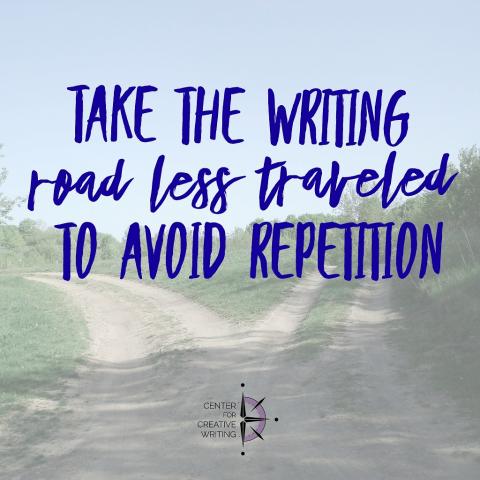
Repetitive writing happens when writers become too reliant on certain words, phrases, or sentence structures. We move off the unexplored paths when we don’t add variety to our word choices, instead leaning on well-traveled language or a trusted but unnecessary crutch.
Fear of the unknown is common, but writing is about taking risks. Sometimes the best method to break free of writing redundancies, to take the risks that turn writing (and later reading what was written) to adventure, is a conscious fork from the known.
Consider this: Creating a draft is the equivalent of taking a drive. You can stay on the roads you know, never straying, maybe stopping to appreciate the view from the same spots as previous passersby; or you can take unexpected turns, discovering clear roads free from what you and others have left behind.
That fork? In this case, it means choosing the least-traveled-by-you path and learning its curves as you go. When the road starts looking too familiar, your draft might need work. At this point in the drive, it’s helpful to strike through extra words, do away with adjectives, and strip your writing down to the barest form possible while still retaining essential meaning. From this minimalist place, you can rebuild, with careful attention to verbs to allow action words to carry the narrative.
Stripping down your work, though, might feel to some like driving on bald tires—one bump in the road and the tire feels like it’s going to blow, causing you to spin out and lose direction. Instead of erasing all possibility of traction, use these tips for clearing your written path of unnecessary repetition to maintain a grip on the road:
Circle repeated terms
Step away from your writing and look to see how crowded your narrative might be. Too many repeated words? You need to either eliminate the extras or find a synonym. Time to break out a thesaurus. But be careful…
Underline words that have matching meanings
It’s entirely possible to overuse your thesaurus. We’ve all been there. It is the quintessential swing of the pendulum from one extreme of repetition to the other. Instead of relying on the same word, we use every simile possible and convey its meaning again. And again. And again. When your text is overcome with similes and synonyms, ask yourself: does what you are repeating bear repeating? Can you omit it altogether, or leave just one instance of repetition?
A good question to ask yourself repeatedly (ha!) in your revision process is, “Am I being clear?” If you need to say something more than once, perhaps you aren’t being as clear as you thought. If you are being clear, though, you should be able to trust your reader to follow along. Not sure if anyone is following?
Read your work out loud
I can’t stress this tip enough, whether your writing hiccup is with redundancy or some other issue entirely. Reading your words, in your voice, is the best way to self-edit. Make notes as you go, starring sentences (or lines in non-metered poems) that have the same length and structure, or marking places where your sentences are varied. Repetitive sentence structure creates textual monotony. Regardless of what is happening in your writing, good writing becomes boring when it relies too heavily on one method of communication. Make sure to use long and short sentences, even fragments, and to create layered meanings when you break lines in poetry.
Gain a better understanding of style—yours and others’
Sometimes repetition is a good thing! Songs use refrains to create a chorus, the part where everyone knows the words and can sing along. Some poets employ refrain lines to create a musical effect, and some poetic forms build repetition into their structure to create a certain mood or emotion, or to call a reader’s attention to a specific image. Even in prose, whether fiction or nonfiction, you might repeat certain images to create visual echoes, a more subtle method of repetition that shows rather than tells readers how to feel, what to pay attention to, and so on. Know the difference—by reading and considering other writers’ uses of repetition—what works and what doesn’t. Learn your own proclivities, the kinds of words, phrases, sentences structures, and so on that you use most often, and try to switch it up a little.
In the end, reliance on repetition causes the reader to remember they are reading; what you want is for readers to lose themselves in the journey you have created for them through words. Reducing repetition serves to smooth out the ride, allowing the reader to settle in deeper.
Remember: stronger word choices create traction, while repetition erodes your tires. Maintain your grip on the writing road by saying it right the first time. Happy travels!
Related reading: Write your way out of a rut
Write to connect with readers and be remembered
Want to receive tips and inspiration like this in your inbox every Sunday morning? Join our email list community! You will receive weekly advice, a year’s worth of weekly writing prompts as a FREE download, and be eligible to participate in our monthly photo prompt contest for a chance to share an original piece of writing with our community of over 1,200 subscribers!
Add new comment
Restricted html.
- Allowed HTML tags: <a href hreflang> <em> <strong> <cite> <blockquote cite> <code> <ul type> <ol start type> <li> <dl> <dt> <dd> <h2 id> <h3 id> <h4 id> <h5 id> <h6 id>
- Lines and paragraphs break automatically.
- Web page addresses and email addresses turn into links automatically.

Shawna Ayoub is an essayist, fiction writer, poet, and instructor with an MFA in Creative Writing from Indiana University. Some of her work has been published in The Manifest-Station , Role Reboot , [wherever] , The Huffington Post, The Oxford Review and Exit 7 . Her writing explores the intersections of race, place and survivorship. She writes with honesty about her own experience in order to transform pain.
Copyright 2020 ~ Center for Creative Writing

What is Repetition in Writing? Examples, Definitions, and How to Create Them
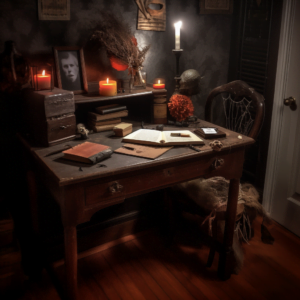
Repe t ition, or epistrophe, is w hen you use the same words or phrases more than once in your writing. It can be used to emphasize certain points or ideas , but it can also get really annoying , really quickly . So use it sparing ly , or you risk making your reader want to hit the ‘ skip ‘ button . A famous example is the ‘ ros es are red , v io lets are blue ‘ of the classic Valentine ‘s Day poem .
The Purpose of Repetition in Writing
Repetition serves various functions in writing. It can be the salt in the soup, the cherry on top, or the annoying fly buzzing around the reader’s head. Let’s explore some of the key reasons why writers choose to use repetition:
Emphasis on a Point
Sometimes, a point is so important that it deserves a bit of extra attention. Repetition can help drive home the point and make sure it sticks in the reader’s mind like gum on a shoe.
Establishing Rhythm and Flow
Repetition can help create a sense of rhythm and flow in writing, much like the steady beat of a drum in a song. It can make the words dance on the page and keep the reader engaged.
Setting a Mood or Tone
Repeating words or phrases can also help to set a particular mood or tone. Like a foghorn in the distance, repetition can evoke feelings of suspense, anticipation, or even unease.
Unifying Ideas
Repetition can serve as a thread that ties together different ideas or themes in a piece of writing. It can be the glue that holds the entire piece together, providing a sense of cohesion and unity.
Types of Repetition
Repetition comes in many flavors, each with its unique taste. Here are a few types of repetition that writers often use:
Anaphora is the repetition of a word or phrase at the beginning of consecutive clauses or sentences. It can make a point resonate like the sound of a gong, echoing through the reader’s mind. For example:
To survive, they needed food. To survive, they needed water. To survive, they needed shelter.
Epiphora, also known as epistrophe, is the repetition of a word or phrase at the end of consecutive clauses or sentences. It’s like a drum roll leading to a big finale. For example:
He wanted to go on an adventure, but fear held him back. He wanted to chase his dreams, but fear held him back. He wanted to live life to the fullest, but fear held him back.
Alliteration
Alliteration is the repetition of consonant sounds at the beginning of words. It can make a sentence feel as smooth as a river stone or as jagged as a mountain peak. For example:
Silly Sally swiftly shooed seven sneaky snakes.
Assonance is the repetition of vowel sounds in words. Like a warm cup of cocoa on a chilly night, it can create a comforting sense of harmony. For example:
The rain in Spain stays mainly in the plain.
Examples of Repetition in Literature
To see how repetition works its magic, let’s dive into some examples from literature:
Example 1: “The Raven” by Edgar Allan Poe
In this classic poem, Poe uses the word “nevermore” as a refrain. The repetition of this word helps to create a haunting, melancholic atmosphere.
“Quoth the Raven, ‘Nevermore.'”
Example 2: “A Tale of Two Cities” by Charles Dickens
In the opening lines of this novel, Dickens uses anaphora to emphasize the contrasts between two cities during a tumultuous time in history:
“It was the best of times, it was the worst of times, it was the age of wisdom, it was the age of foolishness…”
Example 3: “Do Not Go Gentle into That Good Night” by Dylan Thomas
Thomas employs repetition in this poem to create a sense of urgency and defiance:
“Do not go gentle into that good night, Old age should burn and rave at close of day; Rage, rage against the dying of the light.”
How to Create Repetition in Writing
Now that we’ve seen repetition in action, let’s explore some tips for adding a sprinkle of repetition to your own writing:
1. Identify the Purpose
Before using repetition, consider the purpose it will serve. Is it for emphasis, rhythm, mood, or unity? Knowing the purpose will help guide you in choosing the right type of repetition.
2. Keep It Simple
Repetition works best when it’s clear and straightforward. Don’t overcomplicate things or try to be too clever. Simplicity is the key to making repetition effective.
3. Use It Sparingly
Like hot sauce on a taco, a little repetition goes a long way. Too much repetition can become tiresome or annoying to the reader. Use it judiciously to keep the reader engaged and interested.
4. Vary Your Repetition
Mix it up by using different types of repetition throughout your writing. This will keep things fresh and prevent the reader from becoming bored with the same kind of repetition over and over.
5. Revise and Edit
After writing your piece, go back and review your use of repetition. Make sure it’s serving its intended purpose and not detracting from the overall quality of your writing.
In conclusion, repetition can be a powerful tool in a writer’s toolbox when used with care and intention. By understanding its purpose, types, and how to use it effectively, you can create memorable, engaging pieces that resonate with readers. Now, go forth and repeat—just not too much!
If you’re thirsty for more writing knowledge, head over here to learn all 74 literary devices .
About The Author
Related Posts
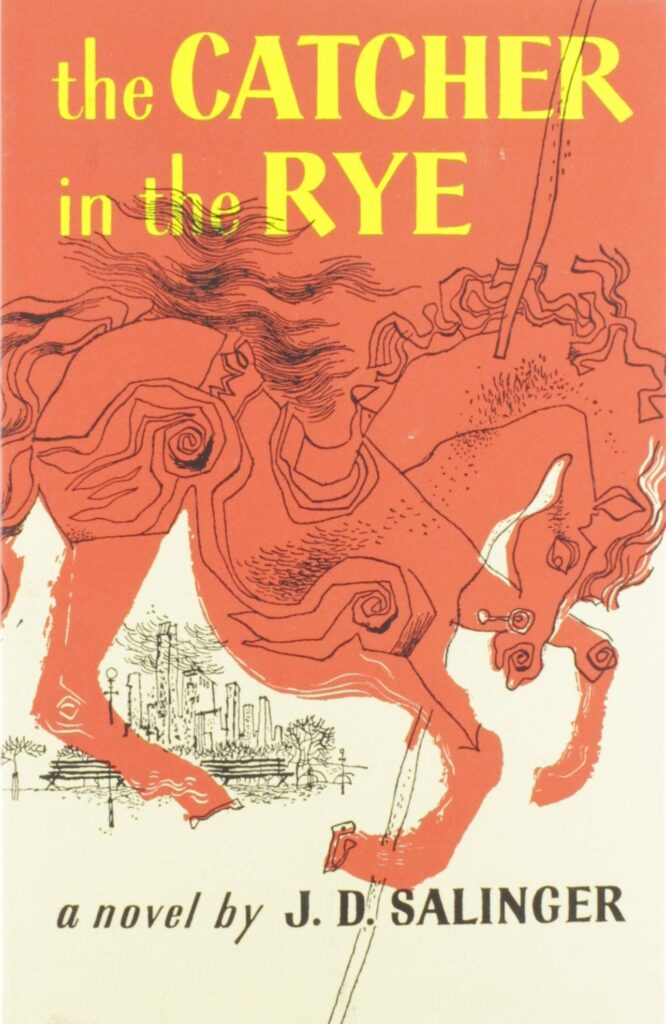
Book Review: The Catcher in the Rye by J. D. Salinger
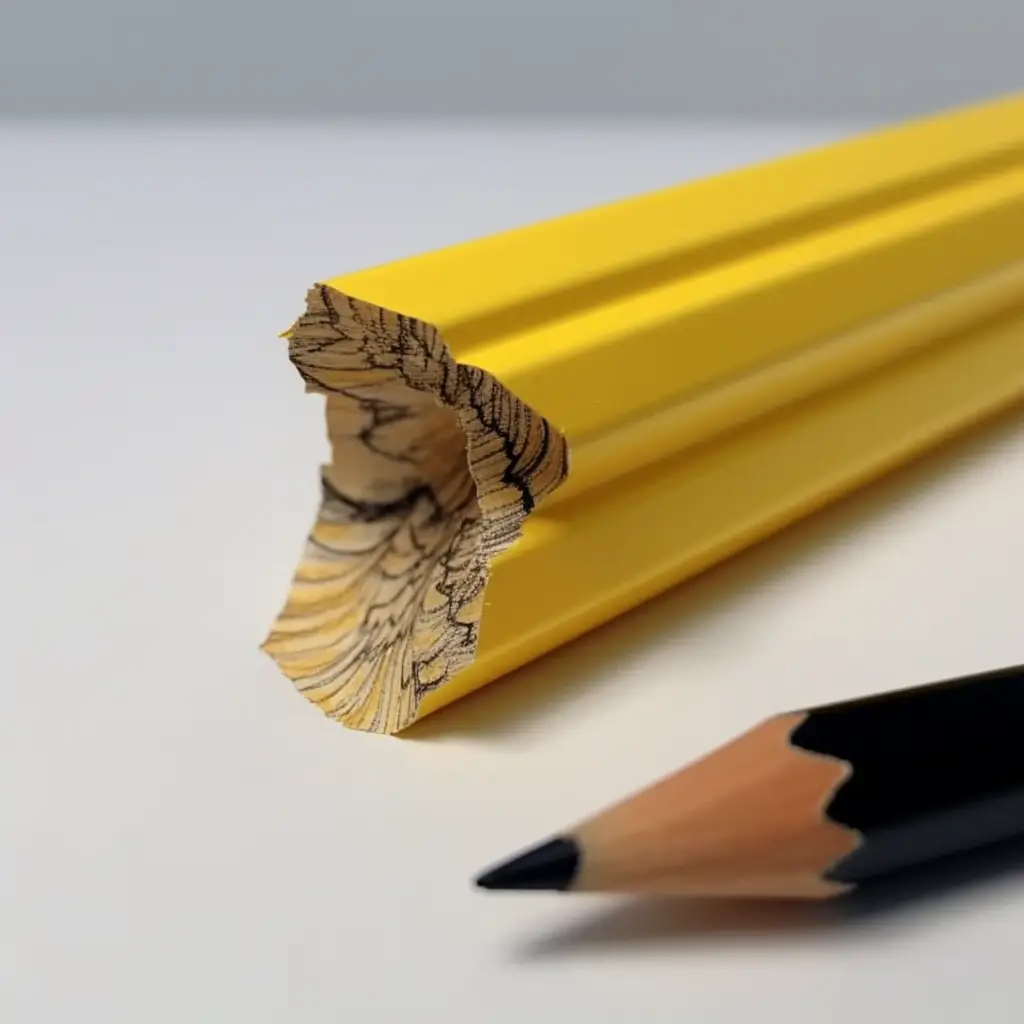
What is a Polyptoton in Writing? Examples, Definitions, and How to Create Them

What is Epimone in Writing? Examples, Definitions, and How to Create Them
Leave a comment cancel reply.
Your email address will not be published. Required fields are marked *
Looking to publish? Meet your dream editor, designer and marketer on Reedsy.
Find the perfect editor for your next book
1 million authors trust the professionals on Reedsy. Come meet them.
Blog • Perfecting your Craft , Book Design
Last updated on Aug 18, 2023
60 Literary Devices and Techniques Every Writer Must Know
A literary device is a writing technique that writers use to express ideas, convey meaning, and highlight important themes in a piece of text. A metaphor, for instance, is a famous example of a literary device.
These devices serve a wide range of purposes in literature. Some might work on an intellectual level, while others have a more emotional effect. They may also work subtly to improve the flow and pacing of your writing. No matter what, if you're looking to inject something special into your prose, literary devices are a great place to start.

Sentence-level devices
1. alliteration.
Alliteration describes a series of words in quick succession that all start with the same letter or sound. It lends a pleasing cadence to prose and Hamlet and the dollar as currency in Macbeth .
Example: “ One short sleepe past, wee wake eternally,
And death shall be no more; death, thou shalt die.” — “Death, Be Not Proud” by John Donne
Exercise: Pick a letter and write a sentence where every word starts with that letter or one that sounds similar.
2. Anaphora
Anaphora is the repetition of a word or phrase at the beginning of a series of clauses or sentences. It’s often seen in poetry and speeches, intended to provoke an emotional response in its audience.
Example: Martin Luther King’s 1963 “I Have A Dream” speech.
“I have a dream that one day this nation will rise up and live out the true meaning of its creed.
"… and I have a dream that one day on the red hills of Georgia the sons of former slaves and the sons of former slave owners will be able to sit together at the table of brotherhood.
"… I have a dream that little children will one day live in a nation where they will not be judged by the color of their skin, but by the content of their character.”
Exercise: Pick a famous phrase and write a paragraph elaborating on an idea, beginning each sentence with that phrase.
Similar term: repetition
3. Anastrophe
Anastrophe is a figure of speech wherein the traditional sentence structure is reversed. So a typical verb-subject-adjective sentence such as “Are you ready?” becomes a Yoda-esque adjective-verb-subject question: “Ready, are you?” Or a standard adjective-noun pairing like “tall mountain” becomes “mountain tall.”
Example: “Deep into that darkness peering, long I stood there wondering, fearing.” — “The Raven” by Edgar Allan Poe
Exercise: Write a standard verb-subject-adjective sentence or adjective-noun pairing then flip the order to create an anastrophe. How does it change the meaning or feeling of the sentence?
4. Chiasmus
Chiasmus is when two or more parallel clauses are inverted. “Why would I do that?” you may be wondering. Well, a chiasmus might sound confusing and unnecessary in theory, but it's much more convincing in practice — and in fact, you've likely already come across it before.
Example: “Ask not what your country can do for you; ask what you can do for your country.” — John F. Kennedy
5. Congeries
Congeries is a fancy literary term for creating a list. The items in your list can be words, ideas, or phrases, and by displaying them this way helps prove or emphasize a point — or even create a sense of irony. Occasionally, it’s also called piling as the words are “piling up.”
Example: "Apart from better sanitation and medicine and education and irrigation and public health and roads and a freshwater system and baths and public order, what have the Romans done for us?" — Monty Python’s Life of Brian
6. Cumulative sentence
A cumulative sentence (or “loose sentence”) is one that starts with an independent clause, but then has additional or modifying clauses. They’re often used for contextual or clarifying details. This may sound complex, but even, “I ran to the store to buy milk, bread, and toilet paper” is a cumulative sentence, because the first clause, “I ran to the store,” is a complete sentence, while the rest tells us extra information about your run to the store.
Example: “It was a large bottle of gin Albert Cousins had brought to the party, yes, but it was in no way large enough to fill all the cups, and in certain cases to fill them many times over, for the more than one hundred guests, some of whom were dancing not four feet in front of him.” – Commonwealth by Ann Patchett
Example: Write three sentences that are related to each other. Can you combine the information into a cumulative sentence?
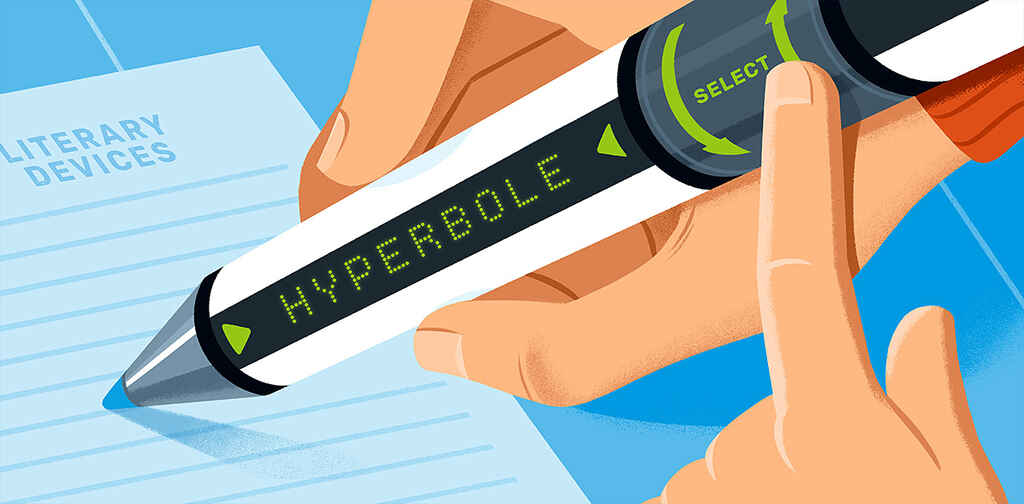
FREE RESOURCE
Literary Devices Cheatsheet
Master these 40+ devices to level up your writing skills.
7. Epistrophe
Epistrophe is the opposite of anaphora, with this time a word or phrase being repeated at the end of a sentence. Though its placement in a sentence is different it serves the same purpose—creating emphasis—as an anaphora does.
Example: “I’ll be ever’where – wherever you look. Wherever they’s a fight so hungry people can eat, I’ll be there. Wherever they’s a cop beatin’ up a guy, I’ll be there . If Casy knowed, why, I’ll be in the way guys yell when they’re mad an’ – I’ll be in the way kids laugh when they’re hungry an’ they know supper’s ready. An’ when our folks eat the stuff they raise an’ live in the houses they build, why, I’ll be there .” — The Grapes of Wrath by John Steinbeck
Similar terms: repetition, anaphora
Exercise: Write a paragraph where a phrase or a word is repeated at the end of every sentence, emphasizing the point you’re trying to make.
8. Erotesis
Erotesis is a close cousin of the rhetorical question. Rather than a question asked without expectation of an answer, this is when the question (and the asker) confidently expects a response that is either negative or affirmative.
Example: “ Do you then really think that you have committed your follies in order to spare your son them?” — Siddhartha by Herman Hesse
Similar term: rhetorical question
9. Hyperbaton
Hyperbaton is the inversion of words, phrases, or clauses in a sentence that differs from how they would normally be arranged. It comes from the Greek hyperbatos, which means “transposed” or “inverted.” While it is similar to anastrophe, it doesn’t have the same specific structure and allows you to rearrange your sentences in whatever order you want.
Example: “Object there was none. Passion there was none. I loved the old man. He had never wronged me. He had never given me insult. For his gold I had no desire.” — “The Tell-Tale Heart” by Edgar Allan Poe
Similar terms: anastrophe, epistrophe
10. Isocolon
If you’re a neat freak who likes things just so , isocolon is the literary device for you. This is when two or more phrases or clauses have similar structure, rhythm, and even length — such that, when stacked up on top of each other, they would line up perfectly. Isocolon often crops up in brand slogans and famous sayings; the quick, balanced rhythm makes the phrase catchier and more memorable.
Example: Veni, vidi, vici (“I came, I saw, I conquered”)
11. Litotes
Litotes (pronounced lie-toe-teez ) is the signature literary device of the double negative. Writers use litotes to express certain sentiments through their opposites, by saying that that opposite is not the case. Don’t worry, it makes more sense with the examples. 😉
Examples: “You won’t be sorry” (meaning you’ll be happy); “you’re not wrong” (meaning you’re right); “I didn’t not like it” (meaning I did)
12. Malapropism
If Shakespeare is the king of metaphors, Michael Scott is the king of malapropisms . A malapropism is when similar-sounding words replace their appropriate counterparts, typically to comic effect — one of the most commonly cited is “dance a flamingo,” rather than a “flamenco.” Malapropisms are often employed in dialogue when a character flubs up their speech.
Example: “I am not to be truffled with.”
Exercise: Choose a famous or common phrase and see if you can replace a word with a similar sounding one that changes the meaning.

13. Onomatopoeia
Amusingly, onomatopoeia (itself a difficult-to-pronounce word) refers to words that sound like the thing they’re referring to. Well-known instances of onomatopoeia include whiz, buzz, snap, grunt, etc.
Example: The excellent children's book Click, Clack, Moo: Cows That Type . “Farmer Brown has a problem. His cows like to type. All day long he hears: Click, clack, moo. Click, clack, moo. Clickety, clack, moo. ”
Exercise: Take some time to listen to the sounds around you and write down what you hear. Now try to use those sounds in a short paragraph or story.
14. Oxymoron
An oxymoron comes from two contradictory words that describe one thing. While juxtaposition contrasts two story elements, oxymorons are about the actual words you are using.
Example: "Parting is such sweet sorrow.” — Romeo and Juliet by William Shakespeare. (Find 100 more examples of oxymorons here .)
Similar terms: juxtaposition, paradox
Exercise: Choose two words with opposite meanings and see if you can use them in a sentence to create a coherent oxymoron.
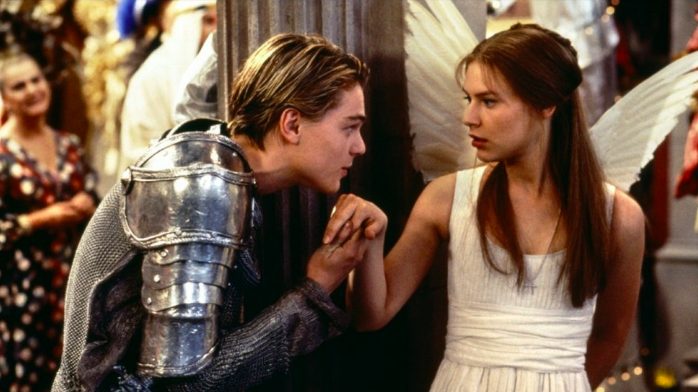
15. Parallelism
Parallelism is all about your sentence structure. It’s when similar ideas, sounds, phrases, or words are arranged in a way that is harmonious or creates a parallel, hence the name. It can add rhythm and meter to any piece of writing and can often be found in poetry.
Example: “ That’s one small step for man, one giant leap for mankind.” — Neil Armstrong
Which famous author do you write like?
Find out which literary luminary is your stylistic soulmate. Takes one minute!
16. Polysyndeton
Instead of using a single conjunction in lengthy statements, polysyndeton uses several in succession for a dramatic effect. This one is definitely for authors looking to add a bit of artistic flair to their writing, or who are hoping to portray a particular (usually naïve) sort of voice.
Example: “Luster came away from the flower tree and we went along the fence and they stopped and we stopped and I looked through the fence while Luster was hunting in the grass.” — The Sound and the Fury by William Faulkner
Exercise: Write three or four independent sentences. Try combining them using conjunctions. What kind of effect does this have on the overall meaning and tone of the piece?
17. Portmanteau
A portmanteau is when two words are combined to form a new word which refers to a single concept that retains the meanings of both the original words. Modern language is full of portmanteaus. In fact, the portmanteau is itself a portmanteau. It’s a combination of the French porter (to carry) and manteau (cloak).
Example: Brunch (breakfast and lunch); cosplay (costume and roleplay); listicle (list and article); romcom (romance and comedy)
Exercise: Pick two words that are often used together to describe a single concept. See if there’s a way to combine them and create a single word that encompasses the meaning of both.
18. Repetition
Repetition , repetition, repetition… where would we be without it? Though too much repetition is rarely a good thing, occasional repetition can be used quite effectively to drill home a point, or to create a certain atmosphere. For example, horror writers often use repetition to make the reader feel trapped and scared.
Example: In The Shining , Jack Torrance types over and over again on his pages, “All work and no play makes Jack a dull boy.” In this case, obsessive repetition demonstrates the character’s unraveling mind.
Similar term: anaphora
Exercise: Repetition can be used to call attention to an idea or phrase. Pick an idea you want to emphasize and write a few sentences about it. Are there any places where you can add repetition to make it more impactful?
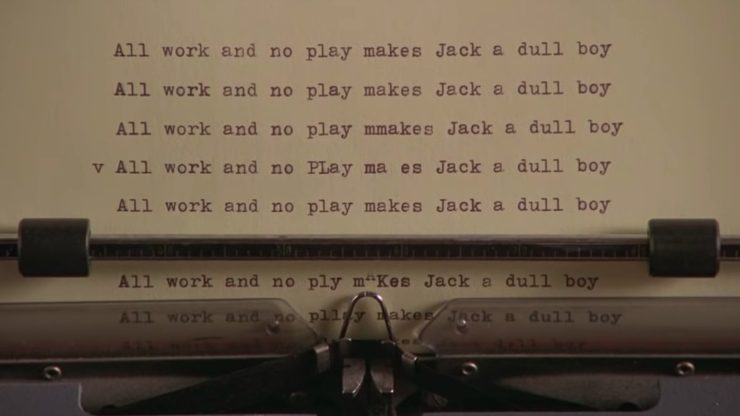
19. Tautology
A tautology is when a sentence or short paragraph repeats a word or phrase, expressing the same idea twice. Often, this is a sign that you should trim your work to remove the redundancy (such as “frozen ice”) but can also be used for poetic emphasis.
Example: "But the fact is I was napping, and so gently you came rapping, And so faintly you came tapping, tapping at my chamber door" – “The Raven” by Edgar Allan Poe

20. Tmesis
Tmesis is when a word or phrase is broken up by an interjecting word, such as abso-freaking-lutely. It’s used to draw out and emphasize the idea, often with a humorous or sarcastic slant.
Example: "This is not Romeo, he's some-other-where." – Romeo and Juliet by William Shakespeare
Narrative devices
21. allegory.
An allegory is a type of narrative that uses characters and plot to depict abstract ideas and themes . In an allegorical story, things represent more than they appear to on the surface. Many children's fables, such as The Tortoise and the Hare , are simple allegories about morality — but allegories can also be dark, complex, and controversial.
Example: Animal Farm by George Orwell. This dystopian novella is one of modern literature’s best-known allegories. A commentary on the events leading up to Stalin's rise and the formation of the Soviet Union, the pigs at the heart of the novel represent figures such as Stalin, Trotsky, and Molotov.
Exercise: Pick a major trend or problem in the world and consider what defines it. Try and create a story where that trend plays out on a smaller scale.
22. Anecdote
An anecdote is like a short story within a story. Sometimes, they are incredibly short—only a line or two—and their purpose is to add a character’s perspective, knowledge, or experience to a situation. They can be inspirational, humorous, or be used to inspire actions in others. Since anecdotes are so short, don’t expect them to be part of a main story. They’re usually told by a character and part of the dialogue.
Example: Marcel Proust’s Swann’s Way , part of his series of novels, In Search of Lost Time, deals with the themes of remembrance and memory. In one section of this book, to illustrate these ideas, the main character recalls an important memory of eating a madeleine cookie. “Many years had elapsed during which nothing of Combray, save what was comprised in the theatre and the drama of my going to bed there, had any existence for me, when one day in winter, as I came home, my mother, seeing that I was cold, offered me some tea, a thing I did not ordinarily take. I declined at first, and then, for no particular reason, changed my mind. She sent out for one of those short, plump little cakes called ‘petites madeleines,’ which look as though they had been moulded in the fluted scallop of a pilgrim’s shell.”
23. Deus Ex Machina
Literally meaning “god in the machine” in Greek, deus ex machina is a plot device where an impossible situation is solved by the appearance of an unexpected or unheard of character, action, object, or event. This brings about a quick and usually happy resolution for a story and can be used to surprise an audience, provide comic relief, or provide a fix for a complicated plot. However, deus ex machinas aren’t always looked upon favorably and can sometimes be seen as lazy writing, so they should be used sparingly and with great thought.
Example: William Golding’s famous novel of a group of British boys marooned on a desert island is resolved with a deus ex machina. At the climax of The Lord of the Flies, just as Ralph is about to be killed by Jack, a naval officer arrives to rescue the boys and bring them back to civilization. It’s an altogether unexpected and bloodless ending for a story about the boys’ descent into savagery.
Exercise: Consider the ending of your favorite book or movie and then write an alternate ending that uses a deus ex machina to resolve the main conflict. How does this affect the overall story in terms of theme and tone?
If you struggle to write consistently, sign up for our How to Write a Novel course to finish a novel in just 3 months.
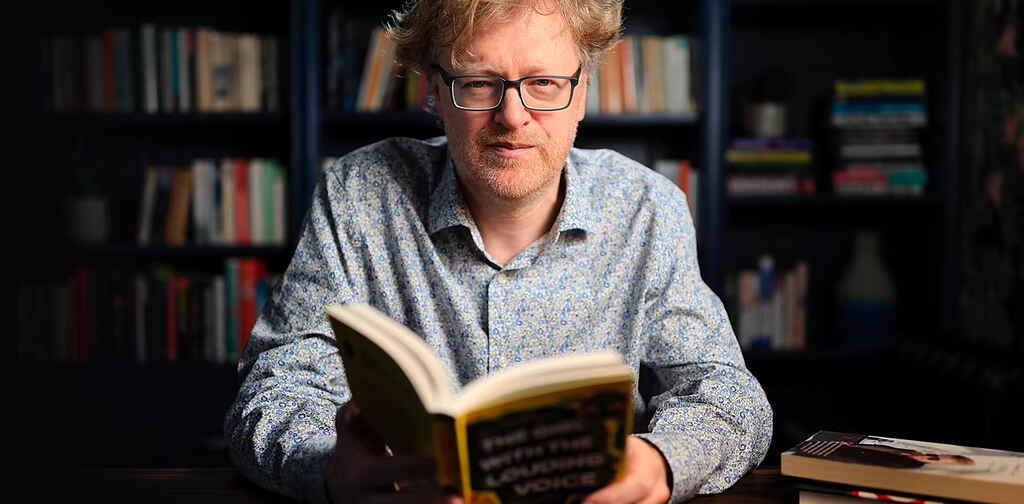
NEW REEDSY COURSE
How to Write a Novel
Enroll in our course and become an author in three months.
24. Dramatic irony
Dramatic irony is when the readers know more about the situation going on than at least one of the characters involved. This creates a difference between the ways the audience and the characters perceive unfolding events. For instance, if we know that one character is having an affair, when that character speaks to their spouse, we will pick up on the lies and double-meanings of their words, while the spouse may take them at face value.
Example: In Titanic , the audience knows from the beginning of the movie that the boat will sink. This creates wry humor when characters remark on the safety of the ship.
25. Exposition
Exposition is when the narrative provides background information in order to help the reader understand what’s going on. When used in conjunction with description and dialogue, this literary device provides a richer understanding of the characters, setting, and events. Be careful, though — too much exposition will quickly become boring, thus undercutting the emotional impact of your work.
Example: “The Dursley’s had everything they wanted, but they also had a secret, and their greatest fear was that somebody would discover it.” – Harry Potter and the Sorcerer’s Stone by J.K. Rowling
Exercise: Pick your favorite story and write a short paragraph introducing it to someone who knows nothing about it.
26. Flashback
Flashbacks to previous events split up present-day scenes in a story, usually to build suspense toward a big reveal. Flashbacks are also an interesting way to present exposition for your story, gradually revealing to the reader what happened in the past.
Example: Every other chapter in the first part of Gone Girl is a flashback, with Amy’s old diary entries describing her relationship with her husband before she disappeared.
Similar term: foreshadowing
27. Foreshadowing
Foreshadowing is when the author hints at events yet to come in a story. Similar to flashbacks (and often used in conjunction with them), this technique is also used to create tension or suspense — giving readers just enough breadcrumbs to keep them hungry for more.
Example: One popular method of foreshadowing is through partial reveals — the narrator leaves out key facts to prompt readers’ curiosity. Jeffrey Eugenides does this in The Virgin Suicides : “On the morning the last Lisbon daughter took her turn at suicide — it was Mary this time, and sleeping pills, like Therese, the two paramedics arrived at the house knowing exactly where the knife drawer was, and the gas oven, and the beam in the basement from which it was possible to tie a rope.”
Similar term: flashback
Exercise: Go back to your favorite book or movie. Can you identify any instances of foreshadowing in the early portions of the story for events that happen in the future?
28. Frame story
A frame story is any part of the story that "frames" another part of it, such as one character telling another about their past, or someone uncovering a diary or a series of news articles that then tell the readers what happened. Since the frame story supports the rest of the plot, it is mainly used at the beginning and the end of the narrative, or in small interludes between chapters or short stories.
Example: In The Name of the Wind by Patrick Rothfuss, Kvothe is telling Chronicler the story of his life over the span of three days. Most of the novel is the story he is telling, while the frame is any part that takes place in the inn.
29. In Medias Res
In medias res is a Latin term that means "in the midst of things" and is a way of starting a narrative without exposition or contextual information. It launches straight into a scene or action that is already unfolding.
Example: “Many years later, as he faced the firing squad, Colonel Aureliano Buendía was to remember that distant afternoon when his father took him to discover ice.” — The opening line of One Hundred Years of Solitude by Gabriel García Márquez
Exercise: Pick a story you enjoy and rewrite the opening scene so that it starts in the middle of the story.
30. Point of view
Point of view is, of course, the mode of narration in a story. There are many POVs an author can choose, and each one will have a different impact on the reading experience.
Example: Second person POV is uncommon because it directly addresses the reader — not an easy narrative style to pull off. One popular novel that manages to employ this perspective successfully is Bright Lights, Big City by Jay McInerney: “You are not the kind of guy who would be at a place like this at this time of the morning. But here you are, and you cannot say that the terrain is entirely unfamiliar, although the details are fuzzy.”
Exercise: Write a short passage in either first, second, or third person. Then rewrite that passage in the other two points of view, only changing the pronouns. How does the change in POV affect the tone and feel of the story?
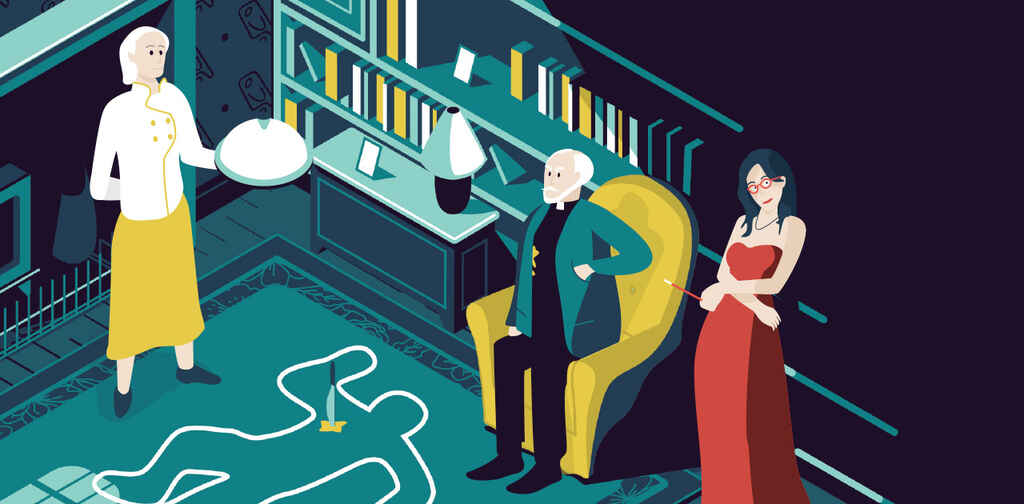
FREE COURSE
Understanding Point of View
Learn to master different POVs and choose the best for your story.
31. Soliloquy
Soliloquy involves a character speaking their thoughts aloud, usually at length (and often in a Shakespeare play). The character in question may be alone or in the company of others, but they’re not speaking for the benefit of other people; the purpose of a soliloquy is for a character to reflect independently.
Example: Hamlet’s “to be or not to be” speech, in which he ruminates on the nature of life and death, is a classic dramatic soliloquy.
Exercise: Pick a character from your favorite book or movie and write a soliloquy from their point of view where they consider their thoughts and feelings on an important part of their story or character arc.
Which writing app is right for you?
Find out here! Takes 30 seconds
Tone refers to the overall mood and message of your book. It’s established through a variety of means, including voice, characterization, symbolism, and themes. Tone sets the feelings you want your readers to take away from the story.
Example: No matter how serious things get in The Good Place , there is always a chance for a character to redeem themselves by improving their behavior. The tone remains hopeful for the future of humanity in the face of overwhelming odds.
Exercise: Write a short paragraph in an upbeat tone. Now using the same situation you came up with, rewrite that passage in a darker or sadder tone.
33. Tragicomedy
Tragicomedy is just what it sounds like: a blend of tragedy and comedy. Tragicomedy helps an audience process darker themes by allowing them to laugh at the situation even when circumstances are bleak.
Example: Lemony Snicket’s A Series of Unfortunate Events uses wordplay, absurd situations, and over-the-top characters to provide humor in an otherwise tragic story.
Conceptual devices
34. allusion.
An allusion is a reference to a person, place, thing, concept, or other literary work that a reader is likely to recognize. A lot of meaning can be packed into an allusion and it’s often used to add depth to a story. Many works of classic Western literature will use allusions to the Bible to expand on or criticize the morals of their time.
Example: “The two knitting women increase his anxiety by gazing at him and all the other sailors with knowing unconcern. Their eerie looks suggest that they know what will happen (the men dying), yet don’t care.” The two women knitting in this passage from Joseph Conrad’s Heart of Darkness are a reference to the Fates from Greek mythology, who decide the fate of humanity by spinning and cutting the threads of life.
Exercise: In a relatively simple piece of writing, see how many times you can use allusions. Go completely crazy. Once you’re finished, try to cut it down to a more reasonable amount and watch for how it creates deeper meaning in your piece.
35. Analogy
An analogy connects two seemingly unrelated concepts to show their similarities and expand on a thought or idea. They are similar to metaphors and similes, but usually take the comparison much further than either of these literary devices as they are used to support a claim rather than provide imagery.
Example: “ It has been well said that an author who expects results from a first novel is in a position similar to that of a man who drops a rose petal down the Grand Canyon of Arizona and listens for the echo.” — P.G. Wodehouse
Exercise: Pick two seemingly unrelated nouns and try to connect them with a verb to create an analogy.
36. Anthropomorphism
To anthropomorphize is to apply human traits or qualities to a non-human thing such as objects, animals, or the weather. But unlike personification, in which this is done through figurative description, anthropomorphism is literal: a sun with a smiling face, for example, or talking dogs in a cartoon.
Examples: In Disney’s Beauty and the Beast , Mrs. Potts the teapot, Cogsworth the clock, and Lumière the candlestick are all household objects that act and behave like humans (which, of course, they were when they weren’t under a spell).
Similar term: personification
Exercise: Pick a non-human object and describe it as if it was human, literally ascribing human thoughts, feelings, and senses to it.
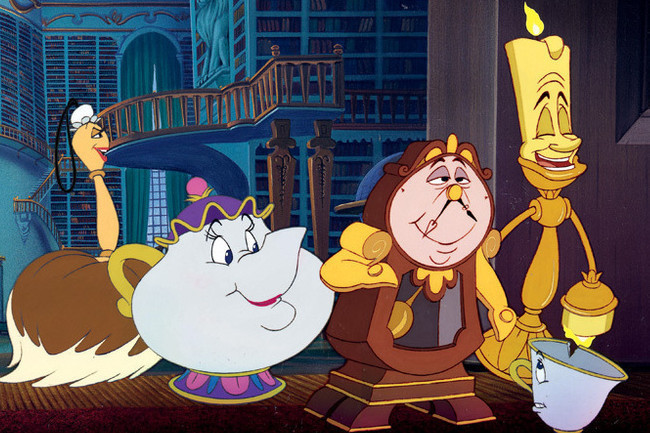
37. Aphorism
An aphorism is a universally accepted truth stated in a concise, to-the-point way. Aphorisms are typically witty and memorable, often becoming adages or proverbs as people repeat them over and over.
Example: “To err is human, to forgive divine.” — Alexander Pope
38. Archetype
An archetype is a “universal symbol” that brings familiarity and context to a story. It can be a character, a setting, a theme, or an action. Archetypes represent feelings and situations that are shared across cultures and time periods, and are therefore instantly recognizable to any audience — for instance, the innocent child character, or the theme of the inevitability of death.
Example: Superman is a heroic archetype: noble, self-sacrificing, and drawn to righting injustice whenever he sees it.
Exercise: Pick an archetype — either a character or a theme — and use it to write a short piece centered around that idea.
A cliché is a saying or idea that is used so often it becomes seen as unoriginal. These phrases might become so universal that, despite their once intriguing nature, they're now looked down upon as uninteresting and overused.
Examples: Some common cliches you might have encountered are phrases like “easy as pie” and “light as a feather.” Some lines from famous books and movies have become so popular that they are now in and of themselves cliches such as Darth Vader’s stunning revelation from The Empire Strikes Back, “Luke, I am your father.” Also, many classic lines of Shakespeare are now considered cliches like, “All that glitters is not gold” from The Merchant of Venice.
Exercise: Write a short passage using as many cliches as possible. Now try to cut them out and replace them with more original phrasing. See how the two passages compare.
40. Colloquialism
Colloquialism is the use of casual and informal language in writing, which can also include slang. Writers use colloquialisms to provide context to settings and characters, and to make their writing sound more authentic. Imagine reading a YA novel that takes place in modern America, and the characters speak to each other like this:
“Good morning, Sue. I hope that you slept well and are prepared for this morning’s science exam.”
It’s not realistic. Colloquialisms help create believable dialogue :
“Hey Sue, what’d you get up to last night? This science test is gonna suck.”
Example: Trainspotting by Irvine Welsh takes place in Scotland, a fact made undeniably obvious by the dialect: “Thing is, as ye git aulder, this character-deficiency gig becomes mair sapping. Thir wis a time ah used tae say tae aw the teachers, bosses, dole punters, poll-tax guys, magistrates, when they telt me ah was deficient: ’Hi, cool it, gadge, ah’m jist me, jist intae a different sort ay gig fae youse but, ken?’”
Exercise: Write a dialogue between two characters as formally as possible. Now take that conversation and make it more colloquial. Imagine that you’re having this conversation with a friend. Mimic your own speech patterns as you write.
41. Euphemism
A euphemism is an indirect, “polite” way of describing something too inappropriate or awkward to address directly. However, most people will still understand the truth about what's happening.
Example: When an elderly person is forced to retire, some might say they’re being “put out to pasture.”
Exercise: Write a paragraph where you say things very directly. Now rewrite that paragraph using only euphemisms.
42. Hyperbole
Hyperbole is an exaggerated statement that emphasizes the significance of the statement’s actual meaning. When a friend says, "Oh my god, I haven't seen you in a million years," that's hyperbole.
Example: “At that time Bogotá was a remote, lugubrious city where an insomniac rain had been falling since the beginning of the 16th century.” — Living to Tell the Tale by Gabriel García Márquez
Exercise: Tall tales often make use of hyperbole to tell an exaggerated story. Use hyperbole to relate a completely mundane event or experience to turn it into a tall tale.
43. Hypophora
Hypophora is much like a rhetorical question, wherein someone asks a question that doesn't require an answer. However, in hypophora, the person raises a question and answers it immediately themselves (hence the prefix hypo, meaning 'under' or 'before'). It’s often used when characters are reasoning something aloud.
Example: “Do you always watch for the longest day of the year and then miss it? I always watch for the longest day in the year and then miss it.” — Daisy in The Great Gatsby by F. Scott Fitzgerald

An idiom is a saying that uses figurative language whose meaning differs from what it literally says. These phrases originate from common cultural experiences, even if that experience has long ago been forgotten. Without cultural context, idioms don’t often make sense and can be the toughest part for non-native speakers to understand.
Example: In everyday use, idioms are fairly common. We say things like, “It’s raining cats and dogs” to say that it’s downpouring.
Exercise: Idioms are often used in dialogue. Write a conversation between two people where idioms are used to express their main points.
45. Imagery
Imagery appeals to readers’ senses through highly descriptive language. It’s crucial for any writer hoping to follow the rule of "show, don’t tell," as strong imagery truly paints a picture of the scene at hand.
Example: “In the hard-packed dirt of the midway, after the glaring lights are out and the people have gone to bed, you will find a veritable treasure of popcorn fragments, frozen custard dribblings, candied apples abandoned by tired children, sugar fluff crystals, salted almonds, popsicles, partially gnawed ice cream cones and wooden sticks of lollipops.” — Charlotte's Web by E.B. White
Exercise: Choose an object, image, or idea and use the five senses to describe it.

Show, Don't Tell
Master the golden rule of writing in 10 five-minute lessons.
Irony creates a contrast between how things seem and how they really are. There are three types of literary irony : dramatic (when readers know what will happen before characters do), situational (when readers expect a certain outcome, only to be surprised by a turn of events), and verbal (when the intended meaning of a statement is the opposite of what was said).
Example: This opening scene from Orson Welles’ A Touch of Evil is a great example of how dramatic irony can create tension.
47. Juxtaposition
Juxtaposition places two or more dissimilar characters, themes, concepts, etc. side by side, and the profound contrast highlights their differences. Why is juxtaposition such an effective literary device? Well, because sometimes the best way for us to understand something is by understanding what it’s not .
Example: In the opening lines of A Tale of Two Cities , Charles Dickens uses juxtaposition to emphasize the societal disparity that led to the French Revolution: “It was the best of times, it was the worst of times, it was the age of wisdom, it was the age of foolishness, it was the epoch of belief, it was the epoch of incredulity, it was the season of Light, it was the season of Darkness…”
Similar terms: oxymoron, paradox
Exercise: Pick two ideas, objects, places, or people that seem like complete opposites. Introduce them side by side in the beginning of your piece and highlight their similarities and differences throughout.
48. Metaphor
A metaphor compares two similar things by saying that one of them is the other. As you'd likely expect, when it comes to literary devices, this one is a heavy hitter. And if a standard metaphor doesn't do the trick, a writer can always try an extended metaphor : a metaphor that expands on the initial comparison through more elaborate parallels.
Example: Metaphors are literature’s bread and butter (metaphor intended) — good luck finding a novel that is free of them. Here’s one from Frances Hardinge’s A Face Like Glass : “Wishes are thorns, he told himself sharply. They do us no good, just stick into our skin and hurt us.”
Similar term: simile
Exercise: Write two lists: one with tangible objects and the other concepts. Mixing and matching, try to create metaphors where you describe the concepts using physical objects.
One metaphor example not enough? Check out this post , which has 97 of ‘em!
49. Metonymy
Metonymy is like symbolism, but even more so. A metonym doesn’t just symbolize something else, it comes to serve as a synonym for that thing or things — typically, a single object embodies an entire institution.
Examples: “The crown” representing the monarchy, “Washington” representing the U.S. government.
Similar term: synecdoche
Exercise: Create a list of ten common metonymies you might encounter in everyday life and speech.
Whatever form a motif takes, it recurs throughout the novel and helps develop the theme of the narrative. This might be a symbol, concept, or image.
Example: In Anna Karenina by Leo Tolstoy, trains are an omnipresent motif that symbolize transition, derailment, and ultimately violent death and destruction.
Similar term: symbol
Exercise: Pick a famous book or movie and see if you can identify any common motifs within it.
51. Non sequitur
Non sequiturs are statements that don't logically follow what precedes them. They’ll often be quite absurd and can lend humor to a story. But they’re just not good for making jokes. They can highlight missing information or a miscommunication between characters and even be used for dramatic effect.
Example: “It was a spring day, the sort that gives people hope: all soft winds and delicate smells of warm earth. Suicide weather.” — Girl, Interrupted by Susanna Kaysen
Exercise: Write a conversation that gets entirely derailed by seemingly unrelated non sequiturs.
52. Paradox
Paradox derives from the Greek word paradoxon , which means “beyond belief.” It’s a statement that asks people to think outside the box by providing seemingly illogical — and yet actually true — premises.
Example: In George Orwell’s 1984 , the slogan of the totalitarian government is built on paradoxes: “War is Peace, Freedom is Slavery, Ignorance is Strength.” While we might read these statements as obviously contradictory, in the context of Orwell’s novel, these blatantly corrupt sentiments have become an accepted truth.
Similar terms: oxymoron, juxtaposition
Exercise: Try writing your own paradox. First, think of two opposing ideas that can be juxtaposed against each other. Then, create a situation where these contradictions coexist with each other. What can you gather from this unique perspective?
53. Personification
Personification uses human traits to describe non-human things. Again, while the aforementioned anthropomorphism actually applies these traits to non-human things, personification means the behavior of the thing does not actually change. It's personhood in figurative language only.
Example: “Just before it was dark, as they passed a great island of Sargasso weed that heaved and swung in the light sea as though the ocean were making love with something under a yellow blanket, his small line was taken by a dolphin.” — The Old Man and the Sea by Ernest Hemingway
Similar term: anthropomorphism
Exercise: Pick a non-human object and describe it using human traits, this time using similes and metaphors rather than directly ascribing human traits to it.
54. Rhetorical question
A rhetorical question is asked to create an effect rather than to solicit an answer from the listener or reader. Often it has an obvious answer and the point of asking is to create emphasis. It’s a great way to get an audience to consider the topic at hand and make a statement.
Example: “If you prick us, do we not bleed? If you tickle us, do we not laugh? If you poison us, do we not die? And if you wrong us, shall we not revenge?” — The Merchant of Venice by William Shakespeare
Writers use satire to make fun of some aspect of human nature or society — usually through exaggeration, ridicule, or irony. There are countless ways to satirize something; most of the time, you know it when you read it.
Example: The famous adventure novel Gulliver’s Travels by Jonathan Swift is a classic example of satire, poking fun at “travelers' tales,” the government, and indeed human nature itself.
A simile draws resemblance between two things by saying “Thing A is like Thing B,” or “Thing A is as [adjective] as Thing B.” Unlike a metaphor, a similar does not posit that these things are the same, only that they are alike. As a result, it is probably the most common literary device in writing — you can almost always recognize a simile through the use of “like” or “as.”
Example: There are two similes in this description from Circe by Madeline Miller: “The ships were golden and huge as leviathans, their rails carved from ivory and horn. They were towed by grinning dolphins or else crewed by fifty black-haired nereids, faces silver as moonlight.”
Similar term: metaphor
57. Symbolism
Authors turn to tangible symbols to represent abstract concepts and ideas in their stories Symbols typically derive from objects or non-humans — for instance, a dove might represent peace, or a raven might represent death.
Example: In The Great Gatsby , Fitzgerald uses the eyes of Doctor T.J. Eckleburg (actually a faded optometrist's billboard) to represent God and his judgment of the Jazz Age.
Similar term: motif
Exercise: Choose an object that you want to represent something — like an idea or concept. Now, write a poem or short story centered around that symbol.
58. Synecdoche
Synecdoche is the usage of a part to represent the whole. That is, rather than an object or title that’s merely associated with the larger concept (as in metonymy), synecdoche must actually be attached in some way: either to the name, or to the larger whole itself.
Examples: “Stanford won the game” ( Stanford referring to the full title of the Stanford football team) or “Nice wheels you got there” ( wheels referring to the entire car)
Similar term: metonymy
Zeugma is when one word is used to ascribe two separate meanings to two other words. This literary device is great for adding humor and figurative flair as it tends to surprise the reader. And it’s just a fun type of wordplay.
Example: “ Yet time and her aunt moved slowly — and her patience and her ideas were nearly worn out before the tete-a-tete was over.” — Pride and Prejudice by Jane Austen
60. Zoomorphism
Zoomorphism is when you take animal traits and assign them to anything that’s not an animal. It’s the opposite of anthropomorphism and personification, and can be either a physical manifestation, such as a god appearing as an animal, or a comparison, like calling someone a busy bee .
Example: When vampires turn into bats, their bat form is an instance of zoomorphism.
Exercise: Describe a human or object by using traits that are usually associated with animals.
Similar terms: anthropomorphism, personification
Readers and writers alike can get a lot out of understanding literary devices and how they're used. Readers can use them to gain insight into the author’s intended meaning behind their work, while writers can use literary devices to better connect with readers. But whatever your motivation for learning them, you certainly won't be sorry you did! (Not least because you'll recognize the device I just used in that sentence. 😏)
6 responses
Ron B. Saunders says:
16/01/2019 – 19:26
Paraprosdokians are also delightful literary devices for creating surprise or intrigue. They cause a reader to rethink a concept or traditional expectation. (https://en.wikipedia.org/wiki/Paraprosdokian)
ManhattanMinx says:
17/01/2019 – 02:07
That's pore, not pour. Shame.....
↪️ Coline Harmon replied:
14/06/2019 – 19:06
It was a Malapropism
↪️ JC JC replied:
23/10/2019 – 00:02
Yeah ManhattanMinx. It's a Malepropism!
↪️ jesus replied:
07/11/2019 – 13:24
Susan McGrath says:
10/03/2020 – 10:56
"But whatever your motivation for learning them, you certainly won't be sorry you did! (Not least because you'll recognize the device I just used in that sentence. 😏)" Litote
Comments are currently closed.
Continue reading
Recommended posts from the Reedsy Blog

How Many Sentences Are in a Paragraph?
From fiction to nonfiction works, the length of a paragraph varies depending on its purpose. Here's everything you need to know.

Narrative Structure: Definition, Examples, and Writing Tips
What's the difference between story structure and narrative structure? And how do you choose the right narrative structure for you novel?

What is the Proust Questionnaire? 22 Questions to Write Better Characters
Inspired by Marcel Proust, check out the questionnaire that will help your characters remember things past.

What is Pathos? Definition and Examples in Literature
Pathos is a literary device that uses language to evoke an emotional response, typically to connect readers with the characters in a story.

How to Start a Children’s Book: Coming Up with Your Big Idea
If you've ever dreamed of writing a children's book but aren't sure where to start, check out this post to learn more about how you can create the perfect story for kids.

How to Become a Travel Writer in 5 Steps: A Guide for Travel Bugs
If you want to get paid to share your adventures, learn how to become a travel writer with these five tips.
Join a community of over 1 million authors
Reedsy is more than just a blog. Become a member today to discover how we can help you publish a beautiful book.

We made a writing app for you
Yes, you! Write. Format. Export for ebook and print. 100% free, always.

1 million authors trust the professionals on Reedsy. Come meet them.
Enter your email or get started with a social account:

What is Anaphora ?
Anaphora is the intentional repetition of a word or phrase at the beginning of successive clauses or sentences. It is a stylistic literary device used to add emphasis and meaning to text or speech.
How to pronounce Anaphora ?
When do writers use anaphora .
Writers use anaphora when they want to emphasize text or speech to make it more memorable and add meaning to the words.
How to use Anaphora?
When using anaphora, it is important to ensure that the repeated word or phrase is appropriate for the context and used consistently throughout the text. Some writers prefer to stick with a Rule of 3, meaning that a repeated word or phrase is repeated exactly 3 times and no more. Keep in mind that repetition for repetition’s sake is not the same thing as anaphora. This type of repetition can make your writing come off as tired and lazy rather than powerful and impactful.
Types of Anaphora
Typically speaking, and to keep things less confusing, anaphora does not have “types.” However, some argue the differentiation between pronouns (i.e., personal, central, and the grouping of personal, number, and gender) constitutes 3 individual types. Making things even more complicated, more advanced schools of thought tend to break this typing into 7 or more distinct forms of anaphora. Having said that, for such a powerful literary tool, anaphora is not a difficult or complicated literary device to master. Although, it is often confused with repetition and its polar opposite, epistrophe.
Anaphora in Literature 📚
While not literature in the proper sense as some might argue, nonetheless, Martin Luther King Jr.’s famous “ I Have a Dream ” has become entrenched in American history and education as a prime example of American literature and anaphora. Note how he begins each sentence with the phrase, “I have a dream.”
“I have a dream that one day even the state of Mississippi, a state, sweltering with the heat of injustice, sweltering with the heat of oppression, will be transformed into an oasis of freedom and justice. I have a dream that my four little children will one day live in a nation where they will not be judged by the color of their skin but by the content of their character. I have a dream today.”
Charles Dickens, “ A Tale of Two Cities ,” – note how each sentence begins with the clause, “It was the,” “we had,” and “we were.”
“ It was the best of times, it was the worst of times, it was the age of wisdom, it was the age of foolishness, it was the epoch of belief, it was the epoch of incredulity, it was the season of Light, it was the season of Darkness, it was the spring of hope, it was the winter of despair, we had everything before us, we had nothing before us, we were all going direct to Heaven, we were all going direct the other way”
J.D. Salinger, The Catcher in the Rye – In this example, Salinger uses what some refer to as the Rule of 3, meaning he repeated the phrase exactly 3 times.
“ It rained on his lousy tombstone, and it rained on the grass on his stomach. It rained all over the place.”
Anaphora in Children’s Literature and Nursery Rhyme 🧸
When used in children’s literature and nursery rhymes, you may find that the words take on a sing-songy sound and feel. As an added bonus, anaphora is easily identified in these works because they need to be easily understood by children.
“Mary Had a Little Lamb” –
“Mary had a little lamb, little lamb, little lamb,
Mary had a little lamb, whose fleece was white as snow.
Everywhere that Mary went, Mary went, Mary went,
Everywhere that Mary went, that lamb was sure to go.”
The Cat in the Hat ,” Dr. Seuss – “Look at me! Look at me! Look at me NOW!” The Very Hungry Caterpillar , ” Eric Carle –
“He ate through one apple, he ate through two apples, he ate through three apples, he ate through four apples.”
Anaphora in Songs 🎧
Sam Cook,“ Wonderful World ” –
“ Don’t know much abou t history,
Don’t know much about biology.
Don’t know much about a science book, Don’t know much abou t the French I took”
Johnny Cash, “ I Walk the Line ,”
“ I keep a close watch on this heart of mine
I keep my eyes wide open all the time
I keep the ends out for the tie that binds
Because you’re mine, I walk the line”
Lincoln Park, “ Pushing Me Awa y” –
“ Why I never walked away Why I played myself this way
Now I see you’re testing me pushes me away
Why I never walked away
Why I played myself this way
Anaphora in Poetry ✍🏽
Maya Angelou, “ Still I Rise ” –
“ You may shoot me with your words,
You may cut me with your eyes,
You may kill me with your hatefulness,
But still, like air, I’ll rise”
From her inaugural poem, Amanda Gorman, “The Hill We Climb” –
Example: “No way man! That’s not true.”
“Every breath from my bronze-pounded chest,
We will raise this wounded world into a wondrous one.
We will rise from the gold-limbed hills of the west.
We will rise from the windswept northeast,
where our forefathers first realized revolution.
We will rise from the lake-rimmed cities of the midwestern states.
We will rise from the sunbaked south.
We will rebuild, reconcile and recover.”
Anaphora in Movies 🎥
Good Will Hunting (1997) –
So if I asked you about art you’d probably give me the skinny on every art book ever written… But I bet you can’t tell me what it smells like in the Sistine Chapel… If I asked you about women you’d probably give me a syllabus of your personal favorites… But you can’t tell me what it feels like to wake up next to a woman and feel truly happy… I ask you about war, and you’d probably, uh, throw Shakespeare at me, right?… But you’ve never been near one. You’ve never held your best friend’s head in your lap and watched him gasp his last breath, looking to you for help…
Anaphora in Advertising 📺
- “Pro camera. Pro display. Pro Performance” – Apple’s iPhone 11 Pro
- “Real ingredients. Real Taste.” – Knorr Selects
- “Open a Coke, Open happiness” – Coca-Cola
- “Always smooth. Always Luckies.” – Lucky Strike cigarettes
Anaphora related literary devices 👥
- Epistrophe – The opposite of anaphora. Epistrophe is the repetition of a word or phrase at the end of a clause or sentence rather than the beginning. Writers use epistrophe for much the same reasons they favor its counterpart, but the two are not interchangeable. the same reasons they favor its counterpart, but the two are not interchangeable. people, by the people, for the people, shall not perish from the earth.”
- Repetition – When a word or phrase is repeated multiple times to add clarity or meaning, While anaphora and epistrophe are types of repetition , they are distinct types and not the same thing.
What is anaphora in literature?
Anaphora is a rhetorical device that involves the repetition of a word or phrase at the beginning of successive sentences, clauses, or lines to create a lyrical effect, emphasize a point, or convey a strong emotion or argument.
How does anaphora enhance a text?
Anaphora enhances a text by adding rhythm, creating emphasis, and making the message more memorable. This repetition can evoke emotions, build up a sense of urgency or importance, and help to unify a section of text by tying sentences or lines together thematically.
Can anaphora be found in both poetry and prose?
Yes, anaphora can be found in both poetry and prose. In poetry, it contributes to the poem’s rhythm and thematic cohesion. In prose, it is often used in speeches and persuasive writing to reinforce a point and evoke an emotional response from the audience.
Why do speakers and writers use anaphora?
Speakers and writers use anaphora to draw attention to a key theme or idea, increase the emotional appeal of their language, and reinforce their message. It’s a powerful tool in speeches and persuasive texts to rally support, create a memorable phrase, or emphasize a significant point.
How can I identify anaphora in a text?
To identify anaphora, look for the deliberate repetition of words or phrases at the beginning of consecutive sentences, clauses, or lines. This pattern of repetition is usually easy to spot and is often used to highlight important concepts or themes within the text.

Blogs for English Excellence
How to Use Vocabulary in Creative Writing to Make Brilliant Stories
If you want to be a writer or really like writing, it’s important to know that vocabulary in creative writing is very important – as it can help you be the best writer you can be.
Creative writing is the way for people to express themselves and share their imaginative stories with others. It doesn’t follow regular writing rules, so it allows writers to create stories, poems, and essays that deeply connect with the readers’ emotions. When you are writing in a creative approach, it is very important to have a large and strong set of words that you know and understand well. This allows you to express your thoughts clearly, create strong mental pictures, and provoke feelings in your readers’ mind.
With Vocavive App , we have been helping students learn and master a strong collection of important English vocabulary. Having this kind of collection of a wide range of words helps writers express their ideas clearly and genuinely, making their creative ideas come alive on paper.
In this article, we will further discuss the words that can greatly help you to create a well-crafted story. We will give you helpful advice and tips to improve your writing skills – which includes choosing the right words, avoiding using the same words too much, and using good transitions.
Let’s get started?
Exploring the Significance of Vocabulary in Creative Writing
Creative writing is incredibly important because it lets us express ourselves and connect with others. It allows us to unleash our imagination, share personal stories, and evoke emotions in readers. The best kind of Creative writings have a great storytelling . They are full of rich expressions that take the reader through a journey.
Now, when it comes to writing effectively, having a good vocabulary is vital. Why?

A wide range of words helps us to convey our thoughts, emotions, and visuals in the best possible way. The work gets easier for the writer. But is it only that?
It also enables us to create vivid imagery in readers’ minds, develop intriguing characters, and construct realistic worlds. Numerous research studies have demonstrated this link between a strong vocabulary and writing proficiency. Research conducted by the Educational Testing Service (ETS) reveals that a larger vocabulary enhances the quality and complexity of writing. When we know and use a variety of words, our writing becomes more creative, clear, and profound.
Another study published in the Journal of Educational Psychology found that students with an extensive vocabulary tend to produce more engaging and captivating stories.
Overused Words That Will Make Your Writing Sound Weak
Using a variety of words is important when writing creatively. However, we should try not to use words and phrases which have been used too much in creative writing. We might use those words thinking it will improve the richness, when in fact, it can do the opposite. Those commonly used and overused words can make our writing sound boring and unoriginal.
Let’s look at a list of commonly used words that we should be careful not to use too much.
- Awesome – The word “awesome” is used too much and doesn’t give enough details to describe something impressive or remarkable.
- Beautiful – A word that is often used without giving any specific details or personal viewpoints.
- Brilliant – The word “brilliant” is often used to say something is really good or smart, but it might sound overused.
- Cool – An informal word that many people use a lot, but it doesn’t give a clear meaning anymore.
- Cute – Often used to describe something charming or appealing, but it can be used too much and become unoriginal.
- Different – Different is a word that is commonly used to describe something but doesn’t give much information or understanding about it.
- Simple – Simple things are repeated too much and don’t have much meaning, so they don’t show all the details or difficulties involved.
- Great – A word that is often used but it doesn’t provide many details and can be unoriginal.
- Nice – A word that is used too much and doesn’t have enough clear details to describe something well.
- Really – Often used as a word that doesn’t have much meaning and doesn’t make things clearer or more important.
- Amazing – Often used without giving details or showing the real specialness of something.
- Surprising – Used too much and doesn’t have a strong effect because people use it to describe things that happen or experiences that they have frequently.
- Breathtaking – It has been used so much that it lost some of its power and impact.
- Difficult – Often used without giving specific details or explanations about the difficulties being talked about.
- Compelling – Means when something is persuasive or captivating, but it is often used too much and lacks originality.
- Important – Often used to highlight significance without giving different viewpoints or specific details.
- Dramatic – Often used to describe something intense or powerful, but can be unoriginal.
- Effective – Effective is a word we use a lot but it doesn’t tell us much and doesn’t give us any new or special information about what we’re talking about.
- Encouraging – Means giving support or motivation, but it is often used without giving examples or details to explain why it is encouraging.
- Exciting – A word that people use too much, and it’s not very specific in describing the real nature or specialness of an exciting experience or event.
- Fabulous – Frequently used to describe something exceptional or marvelous, but its frequent usage has diminished its impact.
- Fantastic – Often employed as a generic term to convey excitement or positivity, but can lack specificity and originality.
- Fascinating – A common choice to describe something intriguing or captivating, but its frequent usage can make it sound clichéd.
- Fortunate – Frequently used without providing unique details or perspectives on the nature of the good fortune.
- Genius – Overused to describe exceptional intelligence or talent, but its frequent use can diminish its impact.
- Helpful – A commonly used term that lacks specificity, failing to convey the specific ways in which something or someone is helpful.
- Incredible – Often used generically to express disbelief or awe, but its frequent usage can dilute its impact.
- Inspiring – Frequently used to describe something that motivates or encourages, but can sound clichéd without offering specific examples.
- Interesting – A generic term used to convey engagement or curiosity, but its overuse can make it sound unoriginal.
- Magnificent – Frequently used to describe something grand or impressive, but its frequent usage can lessen its impact.
- Memorable – Often used without providing specific details or insights into what makes something truly memorable.
- Outstanding – A common descriptor for excellence, but its overuse can make it sound less impactful or unique.
- Powerful – Frequently used to convey strength or influence, but its frequent usage can make it lose some of its impact.
- Remarkable – Often used to describe something extraordinary or noteworthy, but its frequent usage can diminish its impact.
- Significant – A frequently used term to express importance or meaning, but its overuse can make it sound clichéd.
- Spectacular – Often used to describe something visually stunning or impressive, but its frequent usage can make it lose impact.
- Striking – Frequently used to describe something visually or emotionally impactful, but its overuse can diminish its effect.
- Substantial – A common term used to convey importance or size, but its overuse can make it sound generic or lacking in specificity.
- Successful – Often used without providing specific criteria or context for defining success.
- Surprising – Frequently used to convey unexpectedness, but its overuse can make it sound less impactful or genuine.
- Terrific – A commonly used term to express enthusiasm or positivity, but its frequent usage can make it sound clichéd.
- Unique – Often used to describe something one-of-a-kind or distinct, but its frequent usage can diminish its impact.
- Valuable – Frequently used to express worth or importance, but its overuse can make it sound less impactful or specific.
- Vivid – A commonly used term to describe something vibrant or intense, but its frequent usage can make it sound unoriginal.
- Wonderful – Often employed as a generic term to convey delight or positivity, but its frequent usage can diminish its impact.
- Worthwhile – Frequently used to express value or significance, but its overuse can make it sound less impactful or meaningful.
Use these 14 Types of Transition Vocabulary In Creative Writing
Effective transitions help connect ideas and make it easier for readers to follow along with the story or information. By using connecting words and phrases, writers often make their work easier to understand and flow better. Here are the Transition Words and Phrases you should keep in your volt.
Addition: again, also, besides, too, furthermore, moreover, in addition, first, second, third, next, lastly
Contrast: but, however, nevertheless, on the other hand, conversely, yet, although, even though, while, whereas
Comparison: similarly, likewise, in the same way, as, just as, than, like
Cause and Effect: because, therefore, thus, hence, as a result, consequently, so, for this reason, due to
Time: after, before, during, since, then, when, while, afterwards, next, finally, initially
Sequence: first, second, third, next, then, afterward, finally, to begin with, to start with
Emphasis: indeed, in fact, certainly, of course, truly, really, definitely, undoubtedly
Restatement: in other words, to put it another way, that is, as I said, in short
Clarification: to be more specific, to clarify, in other words, that is to say
Summarization: in summary, to sum up, all in all, in conclusion, to conclude
Example: for example, for instance, to illustrate, as an illustration, as shown
Concession: admittedly, it is true that, I agree that, I grant that, I will admit that
Refutation: however, on the contrary, yet, still, nevertheless, in spite of
Concluding Remarks: to conclude, in conclusion, in summary, to sum up, all in all
Question: How do I Use These Transition Words to Create a More Compelling Read?
To make your paragraphs flow better, it’s important to keep a few practical tips around you that connect your ideas smoothly. First, think carefully about how to move smoothly from one idea to another in your writing. Plan out the order that makes the most sense for your thoughts.
By doing this, you can find out where you need to use transition words and phrases to help readers understand how ideas are connected. Try out different connectors like “also,” “however,” or “likewise,” to keep your readers interested and add some variety to your writing.
Make sure to think about the situation and what you want to say when you write. Choose words that clearly show how your ideas connect to each other. It’s important to put transitions in the right places in sentences to make sure the writing flows smoothly and makes sense. You can put them at the start, in the middle, or at the end of sentences.
Vocabulary Gems to Dazzle Your Teacher in Essay Writing
As students, we often find ourselves striving to impress our teachers with well-crafted answer scripts. Beyond accurate content, an impressive essay demands the strategic use of vocabulary to showcase our language prowess and command over the subject matter. Let’s take a look at it with an example.
Before Using Vocabulary:
Imagine you are writing an essay about the American Revolution. In the fayirst scenario where there is no vocabulary, your essay may read like this –
“The American Revolution was a significant event in history. The colonists fought against British rule for their freedom.”
After Using Vocabulary:
Now, let’s see the same essay with an improved vocabulary usage –
“The American Revolution stands as a pivotal milestone in history, epitomizing the relentless spirit of the colonists who valiantly waged a battle for their emancipation from British dominion .”
Which one do you think has more richness?
See, the “after” scenario here elevates the description of the American Revolution by incorporating words like “pivotal milestone,” “relentless spirit,” and “valiantly waged a battle.”
Your classroom might have 20+ students. To stand out from the general crowd, you can use vocabulary like these. It not only demonstrates a more nuanced understanding of the said topic, but it also brilliantly captures the attention of the reader, including your teacher. She might feel more convinced to give you an A.

How to use specific words, descriptive language, and figurative language in creative writing
When describing emotions, shy away from simplistic and overused terms, such as “happy” or “sad”, or “very important”. Instead, try to opt for colorful alternatives that bring your characters’ feelings to life. For instance, rather than stating “The boy was happy,” say “The boy was grinning ear to ear, his eyes twinkling with excitement.” Such descriptions allow your readers to experience the joy alongside the character.
You also need to pay attention to employing descriptive language that adds depth and color to your writing. For example, replace mundane phrases like “The sky was blue” with a more captivating expression. It could be “The sky was a brilliant azure blue, stretching out like a vast ocean.” When you are using such rich language, your readers can feel as though they’re witnessing the scene firsthand.
Coming to figurative language, utilize similes, metaphors, and personification. This will leave a lasting impact on your audience who want to enjoy and feel connected to your story. For example, if you had to merely write an expression such as “The boy was strong” – you could very well say “The boy was as strong as an ox.” When this is done, the comparison to “an ox” not only conveys strength but also makes the description more memorable for the reader.
In Conclusion
In your journey as a budding writer, remember that mastering vocabulary in creative writing is not just a skill but a powerful tool for self-expression and captivating your readers. It is a skill that is essential for any writer, but it is especially important for creative writers. When you have a wide vocabulary, you have a wider range of tools to express yourself and bring your stories to life. You can use more precise language to describe your characters, settings, and events.
So don’t be afraid to experiment with new words. The more you use them, the more comfortable you will become with them, and the better your writing will be.
Related Posts

7 Strategies To Unleash Vocabulary Learning Via Meaningful Contexts
Have you ever felt frustrated when learning new words, only to forget them shortly after? Or found yourself struggling to use vocabulary effectively in real-life…
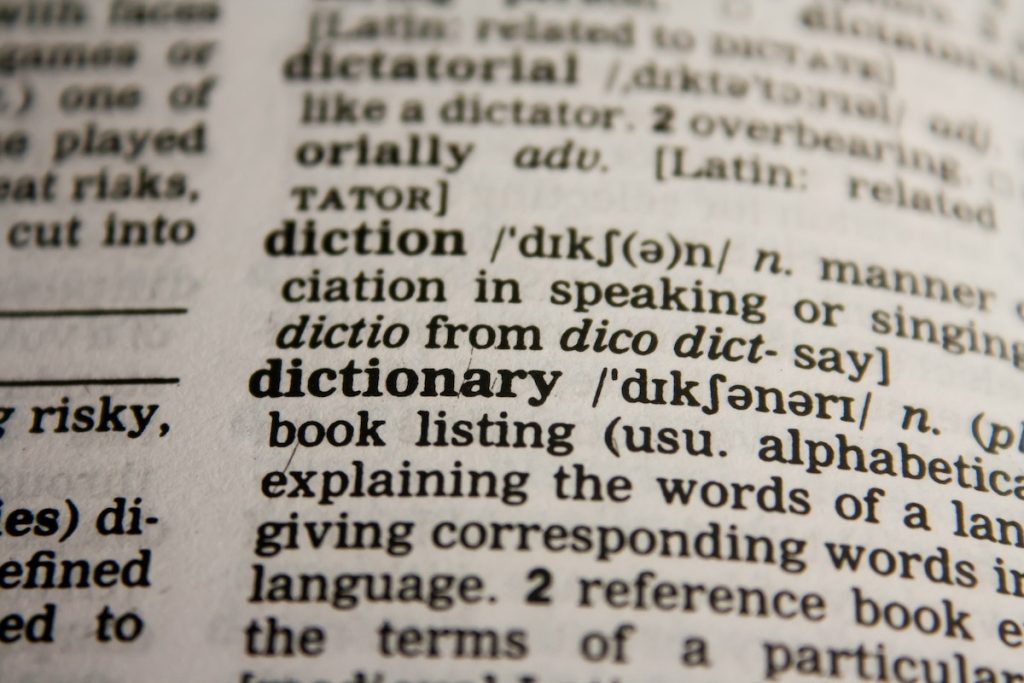
Beyond the Dictionary: 10 Ways Reading Can Unlock Extensive Knowledge
Do you still find yourself flipping through the pages of a dictionary in an attempt to expand your vocabulary? Well, it’s time to set aside…
Leave a Comment Cancel Reply
Your email address will not be published. Required fields are marked *
Save my name, email, and website in this browser for the next time I comment.
Need a free English consultation? Our experts will help within minutes 👉
Thanks! One of our experts will connect with you.
Log in or Sign up
You are using an out of date browser. It may not display this or other websites correctly. You should upgrade or use an alternative browser .
Leaka Creative Mettle

Repeating words in Poetry and Stories
Discussion in ' The Craft of Writing Poetry ' started by Leaka , Dec 18, 2008 .
googletag.cmd.push(function() { googletag.display('funpub_c111fb5f5ab0f03a8163a6d1c14e4e1a'); }); I have always found this interesting in reviewing everyone says you repeated clouds three times in this poem, how about changing clouds to something else. But a lot of the time in poetry I find they don't do this. So, why do people say not to repeat words, when words are repeated in other poems all the time? What is your take on this? The same thing with stories as well, you read some of them and they repeat words. An example would to look at Hemmingways stories for repeating words. And an example of repeating words in poetry would the Lovesonge of Alfred J. Prufrock by T.S. Elliot. Example of Prufrock: "The yellow fog that rubs its back upon the window-panes, The yellow smoke that rubs its muzzles on the window-panes"
Asuran New Member
googletag.cmd.push(function() { googletag.display('funpub_c111fb5f5ab0f03a8163a6d1c14e4e1a'); }); Repetition of words is very emphatic in poetry. Very descriptive in prose - either of the narrator or the character; because the brain wants to flow through the reading, repeating a word makes it think back and pause a bit. For prose however, the technique should be used very sparingly. The above is just my opinion, of course.
ArckAngel New Member
googletag.cmd.push(function() { googletag.display('funpub_c111fb5f5ab0f03a8163a6d1c14e4e1a'); }); Well, in my opinion when poetry is done well, everything done in it is for a reason. Poetry is basically pros condensed. It can tell the same story in 80 pages of pros with 8 lines. So every word must be chosen carefully. Repitation can be a very useful tool if that word has importance. It can also be a stylistic thing. As far as repeating words, or even phrases Woolf does it all the time in 'To The Lighthouse.' And each time it's to emphasize what those lines mean.
tarnished Contributor Contributor

googletag.cmd.push(function() { googletag.display('funpub_c111fb5f5ab0f03a8163a6d1c14e4e1a'); }); Often words can be repeated to slow down the reading of a poem if repeated like "and time went slow slow slow" But, a lot of times in "amateur" poetry words are repeated not for effect but for lack of a better word. When someone repeats a word like "I" or "she" for example, a lot of times these words can be worked around to keep the poem from being tiring and repetitive. I usually only say not to repeat words if I can not find a purpose for it.
Spearnymph New Member
googletag.cmd.push(function() { googletag.display('funpub_c111fb5f5ab0f03a8163a6d1c14e4e1a'); }); I, for one, don't particularly like reading things where repetition is avoided in a forced manner. For example, some people are of the opinion that the word "said" should be minimized. Other people, including me, think that "said" feels natural and focuses on the dialogue. Of course, I think "said" should be replaced by something more expressive, when there is need for it. If it's not used just for the sake of not using it, it can get jarring. Along those lines, I don't agree with having to use a different word every time. It's really up to the writer. I agree with Asuran about how repetition can be very effective in poetry or prose. I wouldn't say "do not repeat" as a rule. I think only the author can judge whether the repetition is due to weakness in expression, but it can be intended in several ways - style, emphasis, flow, mood etc.
mammamaia nit-picker-in-chief Contributor
googletag.cmd.push(function() { googletag.display('funpub_c111fb5f5ab0f03a8163a6d1c14e4e1a'); }); there must always be a good reason for repeating a word in either poetry or prose... imo, if it's not done on purpose for a very good reason and doing so doesn't make sense to the readers, then the repeat should be changed to something else...
rory Active Member
googletag.cmd.push(function() { googletag.display('funpub_c111fb5f5ab0f03a8163a6d1c14e4e1a'); }); I think I remember hearing about someone who wrote a whole story, or something, using the same set number of words. (I apologize that I really can't remember details, it was a long time ago that I heard about it.) I think it was to prove a point that using the same words isn't always a bad thing, and that sometimes people can get carried away trying to use fancy words that mean the same thing. I don't have a problem with reading repeating words, so long as it doesn't get awkward.
tehuti88 New Member
googletag.cmd.push(function() { googletag.display('funpub_c111fb5f5ab0f03a8163a6d1c14e4e1a'); }); It's up to the writer what words they want to use. Sometimes repetition is a good thing. Sometimes it's not. You'll get twenty different people telling you twenty different things. Go with what sounds best to you. Repetition is bad when it's done because the writer has a limited knowledge of appropriate words to use; sometimes it's best to stretch one's horizons. On the other hand, avoiding repetition by using "fancy" words can be just as irritating to the reader. From your example, "clouds" is something that doesn't easily lend itself to an alternate word that means the exact same thing and is in common usage, so you'd probably be best going with just "clouds." However, if you can find a way to minimize repeating it (for example, can you simply omit one of the usages, rather than change it, without affecting the meaning of the poem?), that can help. Long post short, unless it's done for a specific purpose (and some stories and poems do make a point of repeating things for this reason--I get the feeling that "Prufrock" poem is an example), try not to repeat yourself too much, but try not to go out of your way to avoid it if repetition is necessary. It's your call.
Dcoin New Member
googletag.cmd.push(function() { googletag.display('funpub_c111fb5f5ab0f03a8163a6d1c14e4e1a'); }); Many times I will have characters repeat familiar words in their dialog. I feel it adds a certain sense of realism. We all become enamored with certain words, so my characters should as well.
Cogito Former Mod, Retired Supporter Contributor

googletag.cmd.push(function() { googletag.display('funpub_c111fb5f5ab0f03a8163a6d1c14e4e1a'); }); I think the real question should be WHY you repeated a word or phrase. A repeated word or phrase can emphasize it, and become an anchor point that ties different parts of the poem together. But other times, the repetition may simply mean the poet didn't consider, or couldn't think of, alternatives. The poet may not have even realized that the word was overused. I like purposeful repetition, as long as it isn't overdone. There was a recent poem on the site that began every line with the same short word. I don't remember what the word was, but it was a deliberate choice by the writer. But reading it, I felt like a baby seal being clubbed repeatedly with that single word. It wasn't really effective, at least not for me. It was just annoying. I never responded on that thread, but several other members did, so I know I wasn't alone in that perception. Another option is to almost repeat a phrase repetition with slight but important variations. That structure provides a framework that points to those differences with a great flashing neon sign. It can be tremendously effective, or it can be just another big hammer.
googletag.cmd.push(function() { googletag.display('funpub_c111fb5f5ab0f03a8163a6d1c14e4e1a'); }); I like my poetry to have repeated words, not because I can't think of any other word, but because its the one and only word that emphasizes my emotions or my thoughts clearly. To change that word would be changing how I feel or how I think. I like repeating my words. Stories are okay with repeated words, but I prefer poetry with repeating words. I think it invokes a time and place an sequence of thoughts with just one word. I write how I think and I write how I feel at that moment in time. I like my emotions and my thoughts to be a stain that is never cleaned away. [Okay bad metaphor, but you get my point]
hawkedup New Member
googletag.cmd.push(function() { googletag.display('funpub_c111fb5f5ab0f03a8163a6d1c14e4e1a'); }); Not much I see that I can add to this conversation, but I’ll provide my thoughts on the matter without being too… repetitive. These are a few cases when I think you should NOT use repetition: - If it distracts from what the poem is supposed to be. - If the word being repeated is overly simplistic. - If the author simply has a lackluster vocabulary. - If there is no obvious reason for the repetition. - If the repetition is forced. Many amateur poets (in my experience) called on their over abundance of repetition generally fall into making excuses like: “It was intentional. Repetition is okay in poetry.” An imperative thing one must realize while facing the problem of redundancy and repetition is that intention is meaningless. Repetition of a word—just as alliteration, rhyming or not rhyming, stanza length, syllables per line—must have a REASON or a PURPOSE that adds to the poem itself. Just because an author intended to repeat a word doesn’t mean it was the right thing to do. Leaka said: I like my poetry to have repeated words, not because I can't think of any other word, but because its the one and only word that emphasizes my emotions or my thoughts clearly. Click to expand...
googletag.cmd.push(function() { googletag.display('funpub_c111fb5f5ab0f03a8163a6d1c14e4e1a'); }); Add: The Bells by Edgar Allen Poe is a great example of good repetition.
Etan Isar Contributor Contributor
googletag.cmd.push(function() { googletag.display('funpub_c111fb5f5ab0f03a8163a6d1c14e4e1a'); }); hawkedup said: ↑ Not much I see that I can add to this conversation, but I’ll provide my thoughts on the matter without being too… repetitive. These are a few cases when I think you should NOT use repetition: - If it distracts from what the poem is supposed to be. - If the word being repeated is overly simplistic. - If the author simply has a lackluster vocabulary. - If there is no obvious reason for the repetition. - If the repetition is forced. Many amateur poets (in my experience) called on their over abundance of repetition generally fall into making excuses like: “It was intentional. Repetition is okay in poetry.” An imperative thing one must realize while facing the problem of redundancy and repetition is that intention is meaningless. Repetition of a word—just as alliteration, rhyming or not rhyming, stanza length, syllables per line—must have a REASON or a PURPOSE that adds to the poem itself. Just because an author intended to repeat a word doesn’t mean it was the right thing to do. Emotions and thoughts are very intricate and complex things and I can’t imagine that they would be in any way limited to a single word. It is for this reason that I don’t think you should get into the habit of making this excuse. If you like to use repetition in your poetry, that is fine, but to use it because it is the only word you can think of to emphasize an emotion or thought? Eh... I'm sure you can think of others. Or use a thesaurus. Perhaps if you provided an example of a specific instance? Click to expand...
googletag.cmd.push(function() { googletag.display('funpub_c111fb5f5ab0f03a8163a6d1c14e4e1a'); }); Rather, repetition can be the gathering hand which collects blossoms into a bouquet.
googletag.cmd.push(function() { googletag.display('funpub_c111fb5f5ab0f03a8163a6d1c14e4e1a'); }); A thesaurus is a good way to help you improve your vocabulary, as long as you aren't just replacing words without thought. I guess when there is no other one word that suffices, several words could be used? We can't keep relying on a single right word to do all the work for us.
googletag.cmd.push(function() { googletag.display('funpub_c111fb5f5ab0f03a8163a6d1c14e4e1a'); }); IF you use the thesaurus only to find words, and then become thoroughly familiar with the word before trying to use it in your writing. Unfortunately, even a dictionary is generally poor at conveying the finer connotations of a word, the subtle nuances that can make a seemingly better word laughable in actual context. Word of the Day articles can often be better ways to build vocabulary. Alas, even our own WotD feature is deficient in that regard. We had a similar Word of the Day as part of our Toastmaster meetings, but when peoplr try to fit the word into the speeches, they too often stretch the word well beyond its boundaries. I subscribe to a Spanish WotD feature, even though my knowledge of the core language is still pretty meager. But what it DOES do is use the word idiomatically, which helps me learn the meaning of the words I'm able to retain better than I do through the ordinary language lessons. In English, finding the word actually used, and used well, in a number of contexts will enrich your vocabulary far better than learning it from the thesaurus-plus-dictionary. I do use a thesaurus - but only to remind me of the words I already know that might better fit my context.
googletag.cmd.push(function() { googletag.display('funpub_c111fb5f5ab0f03a8163a6d1c14e4e1a'); }); hawkedup said: ↑ Emotions and thoughts are very intricate and complex things and I can’t imagine that they would be in any way limited to a single word. It is for this reason that I don’t think you should get into the habit of making this excuse. If you like to use repetition in your poetry, that is fine, but to use it because it is the only word you can think of to emphasize an emotion or thought? Eh... I'm sure you can think of others. Or use a thesaurus. Perhaps if you provided an example of a specific instance? Click to expand...
googletag.cmd.push(function() { googletag.display('funpub_c111fb5f5ab0f03a8163a6d1c14e4e1a'); }); Maybe only one word as you enter this realm of feeling is the only word that can come to you. Sometimes emotions are bound to just one word. Click to expand...
googletag.cmd.push(function() { googletag.display('funpub_c111fb5f5ab0f03a8163a6d1c14e4e1a'); }); tarnished said: ↑ Example?...I mean I can see one word really fitting you but when crafting a poem there are ways to emphasize one line more than the others and repetition isn't the only method. Personally I think that most of being "bound to" something doesn't mean you should repeat it, and saying only word fits it is a little "lazy" for lack of a better word, and I mean no offense but really. Click to expand...
googletag.cmd.push(function() { googletag.display('funpub_c111fb5f5ab0f03a8163a6d1c14e4e1a'); }); I used it lightly, and I kinda knew you would say it was "rude" lol. To be honest I think you've just made up your mind about his that you have feelings that are confined to one word, which is ok we all have emotions specific to us but there are ways to express emotion- not just through one word. Its obvious you have "shut down", to me atleast, because honestly I presented my post nicely and I;ve learned that everyone will take offense to anything said. So really I kinda see your point but poetry doesn't have to be pure emotion so repeating the same word doesn't add much to it, it sorta just..is there. But hey, we all have our opinions.
googletag.cmd.push(function() { googletag.display('funpub_c111fb5f5ab0f03a8163a6d1c14e4e1a'); }); tarnished said: ↑ I used it lightly, and I kinda knew you would say it was "rude" lol. To be honest I think you've just made up your mind about his that you have feelings that are confined to one word, which is ok we all have emotions specific to us but there are ways to express emotion- not just through one word. Its obvious you have "shut down", to me atleast, because honestly I presented my post nicely and I;ve learned that everyone will take offense to anything said. So really I kinda see your point but poetry doesn't have to be pure emotion so repeating the same word doesn't add much to it, it sorta just..is there. But hey, we all have our opinions. Click to expand...
googletag.cmd.push(function() { googletag.display('funpub_c111fb5f5ab0f03a8163a6d1c14e4e1a'); }); I'm a huge fan of Annabel Lee, and the way Poe uses repetition in all his poems is amazing, which I stated earlier in the thread when I mentioned "The Bells" by Poe. But my point is, repeating words is great when used for a point, and its great that your poetry is all emotion, but not all of it is and I think your making the target area for the topic so incredibly small that only you can "be right" here.
googletag.cmd.push(function() { googletag.display('funpub_c111fb5f5ab0f03a8163a6d1c14e4e1a'); }); No, I just want people to see the other side instead of sitting here and calling people lazy just because they repeated a few words. Because they aren't.
googletag.cmd.push(function() { googletag.display('funpub_c111fb5f5ab0f03a8163a6d1c14e4e1a'); }); Ok in my post I had said that wasn't the word I was looking for and dwelling on it is just completely unnecessary, dodging the actual point of posts and just sticking with one minor part of it is really quite tiresome.
Share This Page
- Log in with Facebook
- Log in with Twitter
- Log in with Google
- No, create an account now.
- Yes, my password is:
- Forgot your password?

- Search titles only
Separate names with a comma.
- Search this thread only
- Display results as threads
Useful Searches
- Recent Posts
- This site uses cookies to help personalise content, tailor your experience and to keep you logged in if you register. By continuing to use this site, you are consenting to our use of cookies. Accept Learn More... Dismiss Notice
Repetition Analyzer
Word proximity tool.

Introducing the Repetition Analyzer , a Word Proximity Checker that's here to transform your creative writing or blog posts. This technology functions as an advanced repetition detector, designed to identify patterns and repeated words or phrases in your text, allowing you to make your writing as engaging and diverse as possible.
By highlighting repeated words and phrases, it allows you to easily identify areas that need variation, hence improving the readability and overall quality of your work.
Not only does it flag repeated single words, but this innovative tool is also capable of detecting multi-word phrases up to five words long that are repeated, offering a more detailed analysis of your text. To avoid false positives, you can specify a list of common words to ignore during the detection process.
But the Repetition Analyzer isn't just about detecting repetition — it's about context too. It colour codes the repetition based on the proximity of repeated words or phrases. Words repeated within close proximity are highlighted in different shades of yellow to red, while those that recur over a wider span are marked in shades of green.
All these features are incorporated into an easy-to-use, interactive interface that makes it incredibly simple to enhance your writing. Whether you're a professional author, a casual blogger, or a student working on an assignment, the Repetition Analyzer is your go-to tool for taking your writing to the next level.
Result (Click on words to highlight or alt+click a word to add to stop words)

170 cool, unique, and beautiful English words to spark a little joy

Karolina Assi
Have you ever experienced serendipity? Do you have a nemesis? Are you a flibbertigibbet? Unless you know what these words mean, you won’t know the answer to these questions!
And if you don’t know what these words mean - don’t worry! It’s estimated that there are 171,146 words in use in the English language, plus around 47,156 obsolete words. That’s a lot of words! No wonder you don’t know all of them, especially if you’re not a native speaker.
However, if you’re as passionate about learning languages as we are (and if you’re reading our blog, then you must be), you know how fun it can be to learn new words in a foreign language. Having a vast vocabulary can not only help you express yourself better, but it’ll also make you sound more eloquent.
So, in this list, we’ve gathered over 170 unique, cool, and beautiful English words that you will love.

Beautiful English words and their meanings
While it’s often said that French and Spanish are the most romantic and beautiful languages, English also has its fair share of beautiful words. You may already know a couple, such as solitude , euphoria , or labyrinth .
If you want to expand your vocabulary with beautifully-sounding words, below you’ll find a list of what we believe to be the most beautiful English words, accompanied by their meanings.
Beautiful English words
While the beauty of a word is subjective and may differ for each of us, many English words are undeniably mellifluous (yes, that’s one of them). This list is the quintessence of the most beautiful English words.
Ready to further your career with a new language?
Get the language skills, cultural understanding and confidence to open up your world with Berlitz.
Beautiful English phrases, sayings, and idioms
Beautiful words lead to beautiful phrases and expressions. English is full of literal and metaphorical expressions that inspire us, bring us joy, or make us wonder about the meaning of life.
Below is a list of some of the most beautiful English phrases, sayings, and expressions.

Cool English words that will make you chuckle
The English language is full of strange, funny words. Some of them are so odd that you can’t help but wonder how they became part of the language! Others sound so funny that they’ll certainly make you chuckle. Love a bit of gibberish? You might enjoy being flabbergasted when you discover the longest words in English here !
Popular slang words in English you need to know
If you’re an internet person who scrolls through Instagram and watches TikTok, you might have seen some words you thought you knew used in a completely different context. While some vocabulary may seem like some sort of a Gen Z code to you, it’s actually quite fun to play around with once you understand it.
With this list of the most popular slang words in English, you’ll be fluent in the TikTok lingo in no time. You can also find 321 more fun American slang expressions here .

And even more unique English words…
Did you know that English has a word for throwing someone out of the window? You’ll be surprised to find out that there are lots of English words that even native speakers aren’t always aware of!
From clinomania to petrichor , you’re about to discover a whole new world of unique words in English that you had no idea existed.
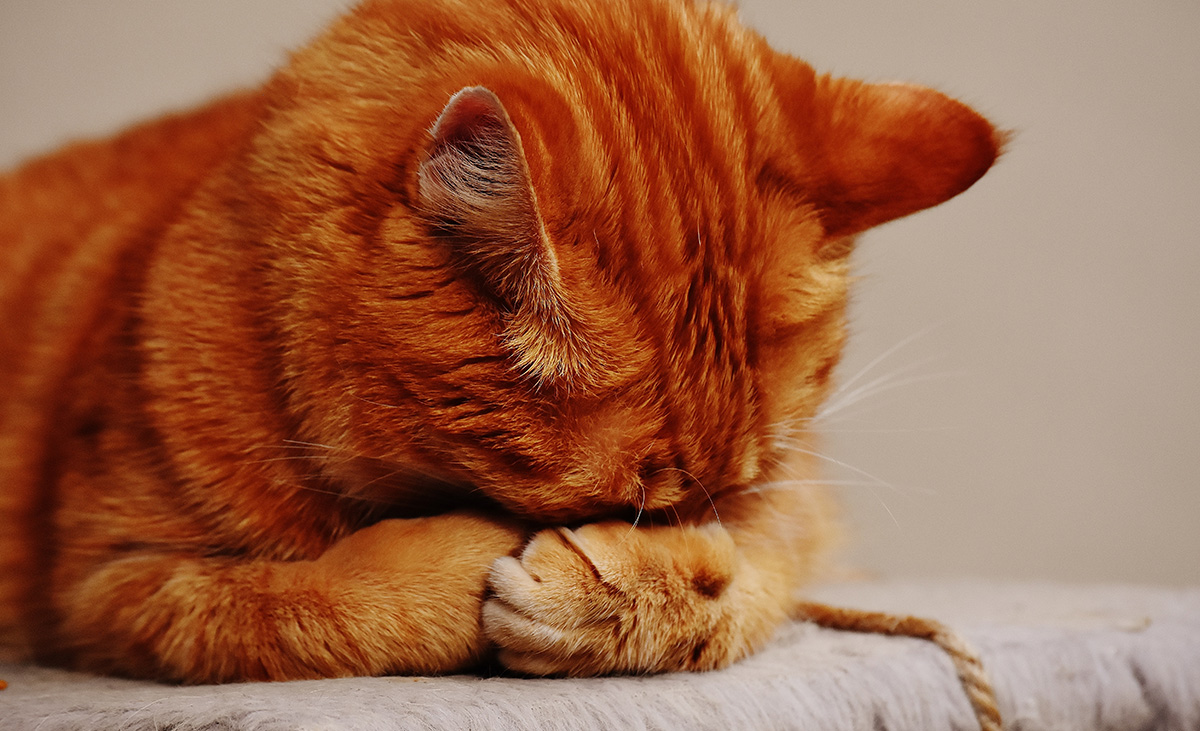
Feeling effervescent?
Learning English words can leave you feeling light-headed! But there’s no need to be lackadaisical or woebegone about it. Everyone can learn new beautiful words in English with a bit of practice, even if it’s a lot of gobbledygook.
We hope that this list of the weirdest, funniest, and most beautiful English words will turn you into a true logophile with an ineffable epeolatry.
Keep up the free English vocabulary fun here.
Expand your knowledge of English
Learn with Berlitz
Related Articles

May 03, 2022
67 ways to say sorry in English to someone, sincerely with grace

April 19, 2022
81 cool, common and quirky ways to say goodbye in English

March 29, 2022
91 ways to say thank you and you’re welcome in English
1-866-423-7548, find out more.
Fill in the form below and we’ll contact you to discuss your learning options and answer any questions you may have.
I have read the Terms of Use and Privacy Policy
- Privacy Policy
- Terms Of Use

IMAGES
VIDEO
COMMENTS
The constant repetition of the word "the ring" at the end of every line helps the reader pay attention to this object throughout the discourse. 6. Epistrophe. This strategy involves repeating a word at the end of every clause or line. This technique helps writers add not just emphasis but also rhythm to their writing.
1. Anaphora. Anaphora is the repetition of a word or phrase at the beginning of several successive clauses that have different endings. This is such a popular tactic in oration that it appears in two of history's most famous speeches—Martin Luther King's "I have a dream" speech and Winston Churchill's "We Shall Fight on These ...
Here are 10 types of repetition, accompanied by examples of each: 1. Anaphora. Anaphora is the repetition of the same word or phrase at the beginning of successive phrases. One of the most famous anaphora examples comes from Martin Luther King Jr.'s famous "I have a dream" speech: "I have a dream that one day this nation will rise up ...
Alliteration. The successive repetition of consonant sounds in the stressed part of a word. Example: "She sells seashells by the sea-shore.". 14. Assonance. The vowel sounds are repeated. Example: ""Hear the mellow wedding bells…" — "The Bells" by Edgar Allan Poe. 15.
10. Antanaclasis. Antanaclasis repeats the same word or phrase but with a different meaning each time. This repeated phrase is also known as a pun because it's a play on words. Benjamin Franklin used it when he said, "Your argument is sound, nothing but sound.". In the first part, he said the argument is solid.
The governing wisdom about writing sentences says not to repeat. Repetition is bad. Repetition is sloppy. Writers are encouraged to consult a thesaurus and change up that pesky offending word. But is this really true? Literature is full of repetition. Literary writers constantly use the literary device of repeated words. I think the only type […]
Repetition can be problematic in writing if it leads to dull work. View repetition examples in literature and writing to strengthen your writing. ... is repeated in another word or group of words: The crowd was wowed by the Flyin' Lion. View a famous example of rhyme in Nature's Way by Heidi Campbell. Notice how the last word in each line ...
Perhaps Apple's copywriters are the poets in the world of marketing. Here are some examples of repetition in Apple's sales copy: Your all purpose, all day notebook. And: iOS 13. A whole new look. On a whole new level. And: Every decision that goes into iPhone makes it stand apart.
Yes, using the same word over and over again is not a good thing, but repeating a word every once in a while can be a good thing. You might want to repeat certain words or phrases to emphasize their importance and show how certain characters have a certain style. This can help the reader to easily distinguish characters. For example:
Repetition is a powerful force in fiction. It can emphasize setting, highlight a character trait, draw attention to a seemingly minor detail. Repetition can also drive your readers crazy. Repeated words, repeated information, repeated sentence construction can turn your reader's attitude from eager interest to downright hostility.
Repetition is a simple and fairly easy device to use in writing. In fact, all you have to do is: Choose words that you think are important and worth stressing. Repeat those words in a way that is memorable. Doing so helps makes them stick out in your audience's mind and establishes them as meaningful. Not overuse it, or it will loose its ...
10/14/2020. Repetitive writing happens when writers become too reliant on certain words, phrases, or sentence structures. We move off the unexplored paths when we don't add variety to our word choices, instead leaning on well-traveled language or a trusted but unnecessary crutch. Fear of the unknown is common, but writing is about taking risks.
Examples, Definitions, and How to Create Them. Repetition, or epistrophe, is when you use the same words or phrases more than once in your writing. It can be used to emphasize certain points or ideas, but it can also get really annoying, really quickly. So use it sparingly, or you risk making your reader want to hit the 'skip' button.
Repetition is an essential device in the writer's toolkit. Used befittingly, it increases coherence, reinforces meaning, and reinforces ideas and messages. By repeating phrases, words, or sentence structures, writers deliberately drive home a point or an emotion, effectively ingraining it into a reader's mind, elevating it beyond merely ...
1. In jazz music, there's a principal sometimes called "repetition and revision" (or "repetition with revision") — a few notes or a musical motif is played and repeated, and then eventually it's played again, but with little changes. A lot of little changes over time can lead, ultimately, to an end that's very different from a ...
7. Epistrophe. Epistrophe is the opposite of anaphora, with this time a word or phrase being repeated at the end of a sentence. Though its placement in a sentence is different it serves the same purpose—creating emphasis—as an anaphora does. Example: "I'll be ever'where - wherever you look.Wherever they's a fight so hungry people can eat, I'll be there.
To identify anaphora, look for the deliberate repetition of words or phrases at the beginning of consecutive sentences, clauses, or lines. This pattern of repetition is usually easy to spot and is often used to highlight important concepts or themes within the text. Discover the power of anaphora, a key literary device used for emphasis and ...
Repeated words, phrases or ideas can often decrease your chances of scoring well on an essay or other piece of writing, but with the help of synonyms and other writing techniques, you will be able to improve your writing. 1: Use Synonyms (in the Right Context) 2: Rephrase an Important Idea. 3: Reorder Sentences. 4: Use Pronouns.
In creative writing, repetition can be used to create a sense of rhythm or emphasize a theme. However, using the same exact wording too often can become predictable and boring. ... Instructions: Rewrite the following sentences, replacing the repeated words with pronouns or synonyms. Original Sentence Revised Sentence; John went to the store and ...
Beautiful - A word that is often used without giving any specific details or personal viewpoints. Brilliant - The word "brilliant" is often used to say something is really good or smart, but it might sound overused. Cool - An informal word that many people use a lot, but it doesn't give a clear meaning anymore.
Creative Writing Forums - Writing Help, Writing Workshops, & Writing Community. Home Forums > Poets' Corner > The Craft of Writing Poetry > Previous Thread Next Thread. ... I like my poetry to have repeated words, not because I can't think of any other word, but because its the one and only word that emphasizes my emotions or my thoughts ...
Introducing the Repetition Analyzer, a Word Proximity Checker that's here to transform your creative writing or blog posts.This technology functions as an advanced repetition detector, designed to identify patterns and repeated words or phrases in your text, allowing you to make your writing as engaging and diverse as possible.
Below is a list of some of the most beautiful English phrases, sayings, and expressions. English. Meaning. A change of heart. To suddenly change your mind. Adventure is the champagne of life. Adventure is what makes life bubbly! Every cloud has a silver lining. Even a negative situation has something positive.